|
February 11, 2017 - No. 4
Canada-U.S.
Relations and
Fight to Affirm Rights
Urgent Need to
Develop Concrete Work in
Defence of the Rights of All
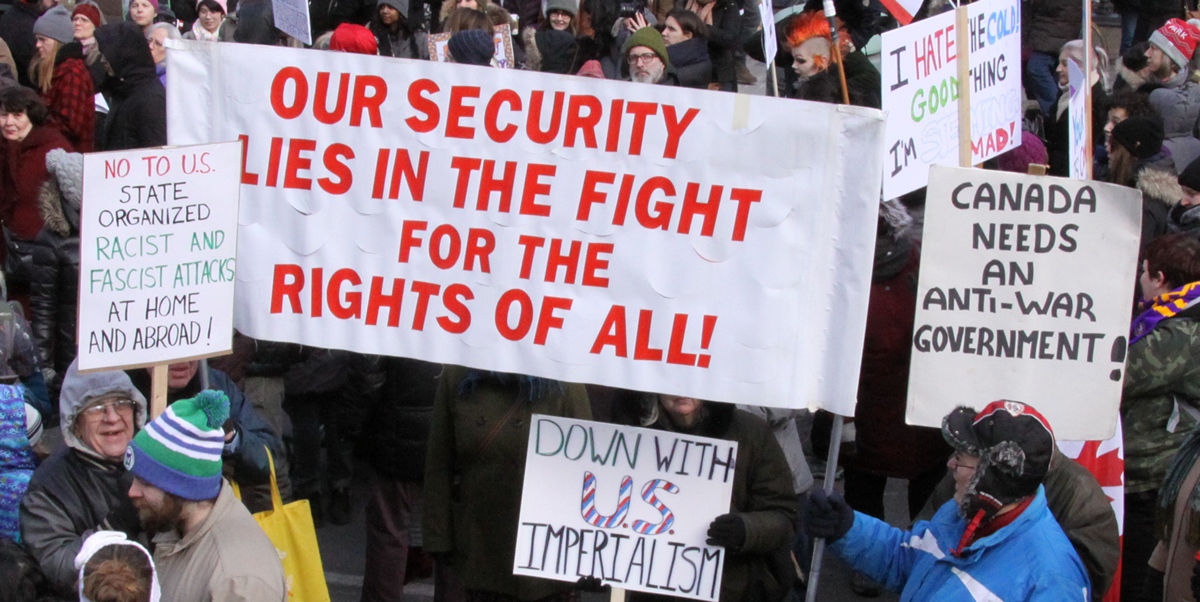
• Trudeau
Goes to Washington -- Nothing Good Will Come of
Repeating False
Ideological Beliefs
- Pauline Easton -
• Step Up the
Struggle to Get Canada
Out of NATO and
All Other Aggressive Military Alliances!
- Margaret Villamizar -
Carleton University
Students and Professors Develop Work
in Defence of
Rights
• Petition Opposes University's
Promotion of Use of Police
Powers to Suppress Speech
• End Carleton University's Support of Group
Promoting Use of
Bill C-51 Against Protesters
• Carleton University's
Infrastructure Resilience Research Group
• What Comprises Critical
Infrastructure?
- Sam Heaton -
Opposition to Toronto
Meeting of Conference of American Armies
• Armed Forces of the Americas
Coordinate "Domestic Operations"
• An Unacceptable Enterprise
- Charlie Vita -
Discussion
• Significance of Talk of Balanced
and Fair Trade
Between Canada and U.S.
- K.C. Adams -
Fifth Summit of
Community of Latin American and Caribbean States
• Meeting Reaffirms Latin America
and the Caribbean
as a Zone of Peace
• Gathering of Social Movements and
Political Forces
• Never Has It Been More Necessary
to Effectively Advance
Along the Path of Unity
- Raúl Castro -
Canada-U.S. Relations and Fight to Affirm
Rights
Urgent Need to Develop Concrete Work in
Defence of the Rights
of All
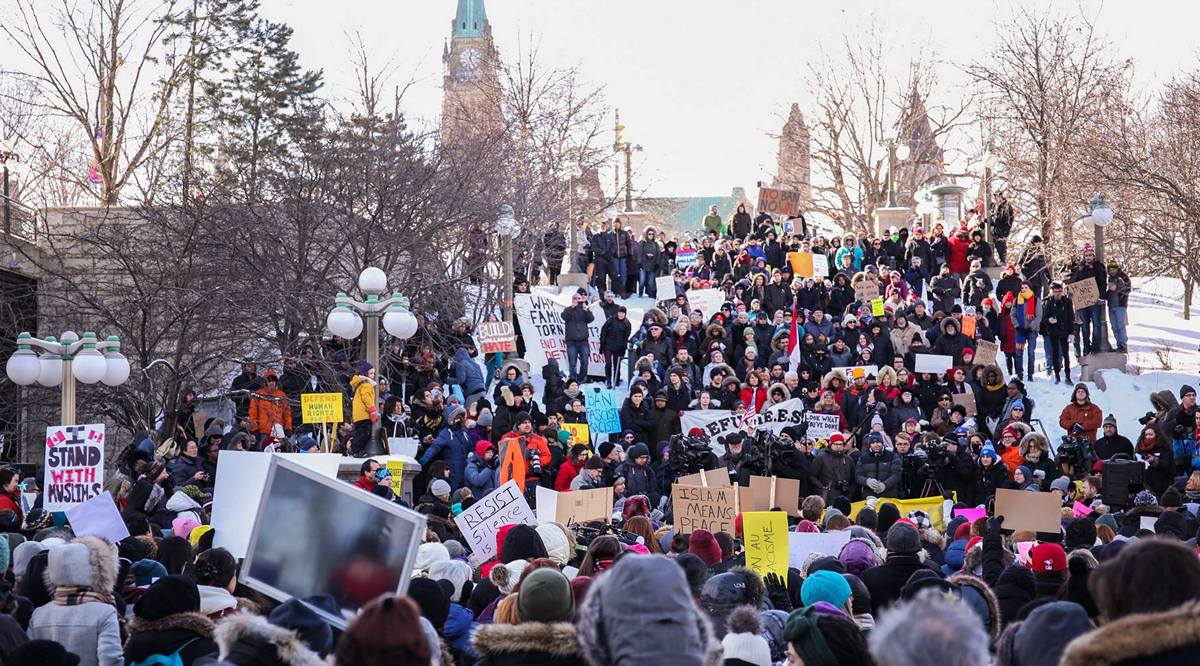
Rally outside U.S. Embassy in Ottawa, January 30, 2017, one of many
across Canada in
defence of rights, and against use of police powers.
This year has already witnessed important mobilizations
of the people in the United States and Canada in defence of rights. The
mass mobilizations involving people from all walks of life have been
without precedent. People have risen en
masse against the use of police
powers and the executive orders of U.S. President Donald Trump on
immigration, the wall on its southern border and banning entry into the
United States by the citizens of seven countries for 90 days and all
refugees for 120 days. The events culminated this week in the decision
of the U.S. Ninth Circuit Court of Appeals to uphold a stay of Trump's
order discriminating against Muslims. Meanwhile, increased raids in
cities across the U.S. by the U.S. Immigration and Customs Enforcement
(ICE) rounding up for deportation working families, women and children
labelled "illegal" have sparked other mass mobilizations in opposition.
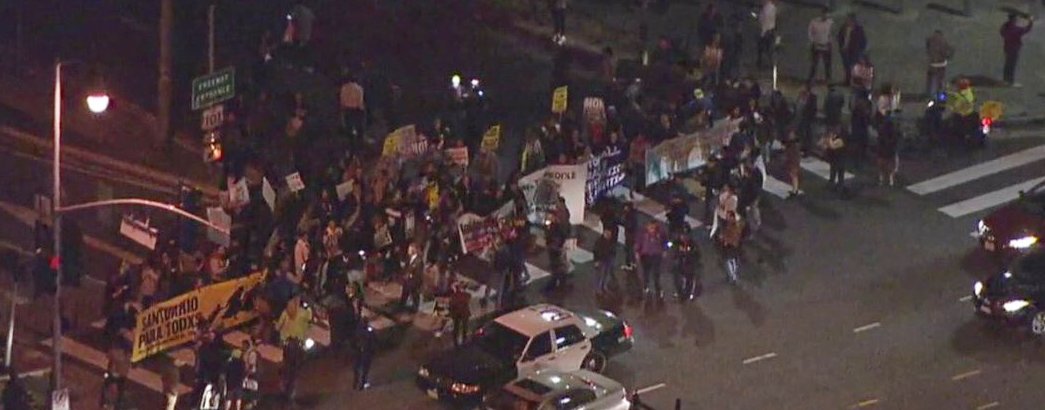
Protest against immigration raids in downtown Los Angeles, February 9,
2017.
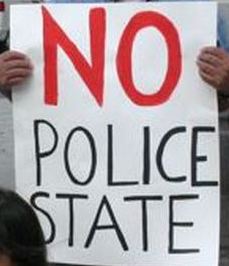 The mass mobilizations
underscore the reality that the peoples are facing an unprecedented
danger from the unfettered use of police powers. While Trump is doing
everything in his power to break through the limits of the
constitution, others are doing their utmost to maintain the
constitutional form. Not just in the United States but also in Canada
and other countries, arrangements are being pushed that claim legality
and justification for the use of police powers to deprive the people of
their rights. It is clear that current constitutional forms are
anachronistic, unable to sort out the contradictions either within the
ruling class or between the rulers and the people. For the people the
fight has become to provide democracy with an altogether modern
definition which provides rights with a guarantee the people can
defend. A democracy which does not permit the people to hold the rulers
to account is not a democracy which serves them. The mass mobilizations
underscore the reality that the peoples are facing an unprecedented
danger from the unfettered use of police powers. While Trump is doing
everything in his power to break through the limits of the
constitution, others are doing their utmost to maintain the
constitutional form. Not just in the United States but also in Canada
and other countries, arrangements are being pushed that claim legality
and justification for the use of police powers to deprive the people of
their rights. It is clear that current constitutional forms are
anachronistic, unable to sort out the contradictions either within the
ruling class or between the rulers and the people. For the people the
fight has become to provide democracy with an altogether modern
definition which provides rights with a guarantee the people can
defend. A democracy which does not permit the people to hold the rulers
to account is not a democracy which serves them.
In
this issue, TML Weekly
is providing
information on
some of the developments taking place, beginning with Prime Minister
Trudeau's visit to Washington and the attempt to divert the attention
of Canadians from the need to provide a new direction for the economy
and Canada-U.S. relations. TML Weekly
also calls on its readers to
vigorously support all those who are fighting in Canada for the
affirmation
of rights against state-sanctioned usurpation. We bring to readers'
attention the work of students and
professors at Carleton University in Ottawa who are taking further
action to stop the use of their university by
state and private agencies to deprive people of their rights
Canada-wide. On February 8, they
launched a petition calling on the university to end its support to a
group called the
Infrastructure Resilience Research Group (IRRG)
coordinating the use of Bill C-51, the Anti-Terrorism Act, 2015 against protestors and
activists. The decision to launch a petition was taken at a previous
meeting last November 22 when students, joined by several professors,
discussed the urgent need to step up opposition to the university
permitting Carleton campus to be used for criminalizing speech and the
people fighting for rights. The petition was distributed and students
decided to begin a campaign of collecting signatures, including holding
class talks, contacting professors and circulating it online and
wherever students gather.
This
week,
activists
in
Toronto
also
organized
opposition
to
the
unacceptable
Conference
of
American
Armies
held
in
that
city
on
February
9. The Conference was
meant to further coordinate the armed forces of the Americas in
conducting "Domestic Operations" against the peoples.
Weekly actions in Vancouver also continue to inform
residents of the dangers of Bill C-51 and demand its repeal. These
actions bring attention to the Trudeau government's continued support
for the enforcement of police powers contained in that legislation,
which it argues is necessary.
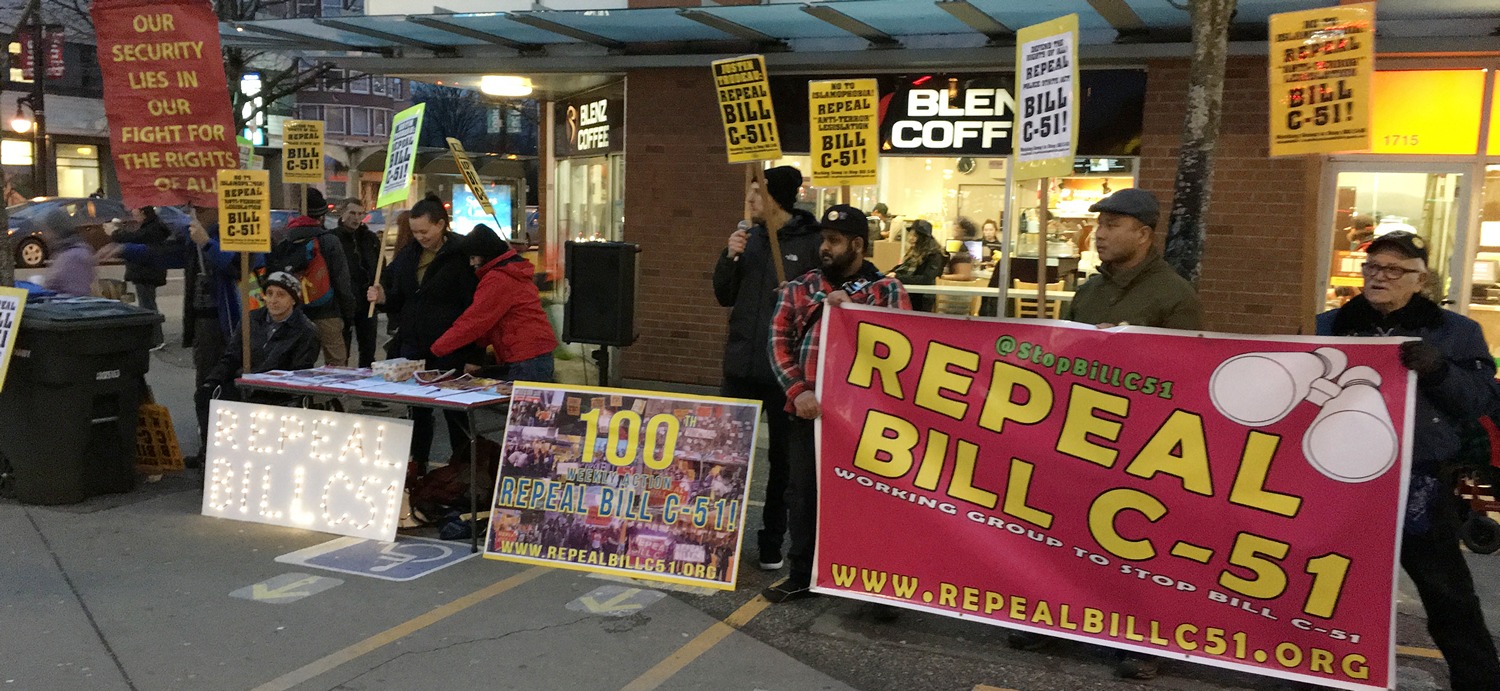
100th Weekly
Action to Repeal Bill C-51, Vancouver, January 30, 2017
TML Weekly calls on the working people and
youth and
all those who uphold the cause of rights to step up their
interventions to ensure the efforts to justify unfettered use of
police powers and arrangements to execute them do not succeed.
These arrangements criminalize speech and conscience. In the name
of high ideals, they turn the conception of rights upside down,
destroying acquired civil rights and further disempowering the
people.
Arrangements in the form of a social contract and civil
society along with representative governments were established some 250
years ago to deprive the autocrats of unfettered power based on alleged
divine right. The rising capitalist class required security for its
ownership of property and predictability to enter into and protect its
business deals. The arrangements which were brought in and definition
of rights have since been usurped, first by monopolies and now by even
more powerful global oligopolies, depriving the vast majority of the
working people of any control over their lives. Definitions and
arrangements established over the past 250 years are no longer adequate
to meet the needs of the times.
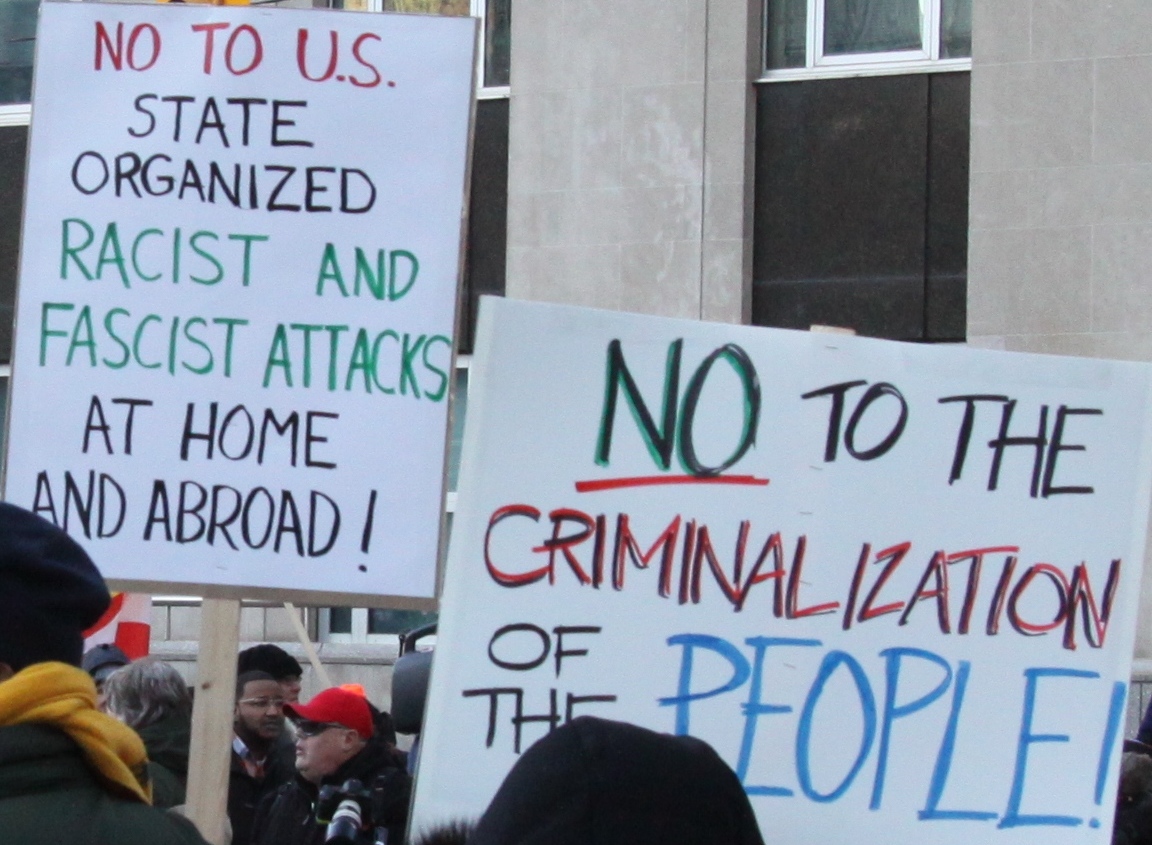 Instead of a renewal of the
arrangements and definitions, including the covenant enshrining the
conception of rights on which society is based, the current rulers
present the people with a government of police powers masquerading as a
government of laws. These changes underscore the need for the people to
go to the essence of what it means to defend rights to guarantee their
security, what it means to uphold the right to conscience and speech,
and why this period needs modern definitions and arrangements that
uphold the rights of all, which people possess by virtue of being
human. How to hold those who govern to account has become the
overriding concern of humankind. Instead of a renewal of the
arrangements and definitions, including the covenant enshrining the
conception of rights on which society is based, the current rulers
present the people with a government of police powers masquerading as a
government of laws. These changes underscore the need for the people to
go to the essence of what it means to defend rights to guarantee their
security, what it means to uphold the right to conscience and speech,
and why this period needs modern definitions and arrangements that
uphold the rights of all, which people possess by virtue of being
human. How to hold those who govern to account has become the
overriding concern of humankind.

Trudeau Goes to Washington -- Nothing Good Will Come of
Repeating False Ideological Beliefs
- Pauline Easton -
Prime Minister Trudeau is confirmed to visit
Washington, DC and meet with U.S. President Donald Trump on Monday,
February 13. Trudeau's decision notably "breaks with tradition" of a
newly elected president first visiting Canada. He does not risk having
Trump come to Canada where it could be predicted that practically the
entire country would protest, creating a security nightmare. The venue
for the meeting notwithstanding, Canada's relationship with the United
States poses grave dangers to the well-being of the Canadian people as
well as contributes to the increasing preparations for a devastating
world war.
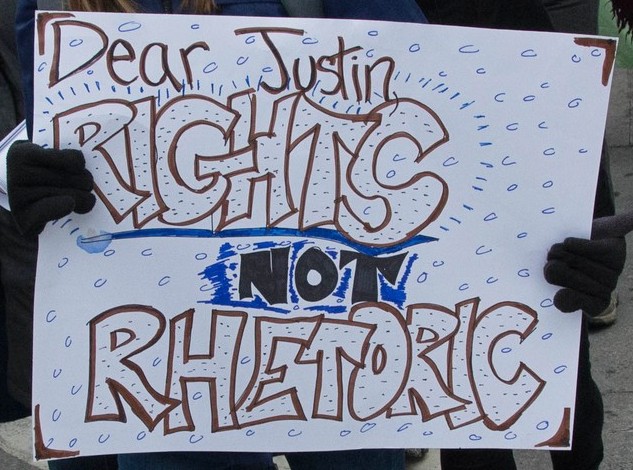 Canadians are concerned with the
developments here and in the
U.S., with the direction of the economy, the erosion of the
rights of all, the escalating war preparations and the all-round
anti-social offensive against the peoples of the world. To divert
attention from these serious issues and the domination of the
U.S. over Canada, the relations are being touted as being
mutually beneficial. Kate Purchase, communications director of
the Prime Minister's Office said, "They [Trudeau and Trump] look
forward to discussing the unique relationship between Canada and
the United States of America and how we can continue to work hard
for middle-class Canadians and Americans, together." The main
items on the agenda are said to be Canada-U.S. trade, and the
military and security relations. Canadians are concerned with the
developments here and in the
U.S., with the direction of the economy, the erosion of the
rights of all, the escalating war preparations and the all-round
anti-social offensive against the peoples of the world. To divert
attention from these serious issues and the domination of the
U.S. over Canada, the relations are being touted as being
mutually beneficial. Kate Purchase, communications director of
the Prime Minister's Office said, "They [Trudeau and Trump] look
forward to discussing the unique relationship between Canada and
the United States of America and how we can continue to work hard
for middle-class Canadians and Americans, together." The main
items on the agenda are said to be Canada-U.S. trade, and the
military and security relations.
Derek Burney, a former Canadian ambassador to the U.S.
and
advisor to Trudeau and former Prime Minister Brian Mulroney, says
Trudeau will "make the point that our relations are not like
others." To disinform Canadians of the issues at stake, Burney
has become a mouthpiece for a government line emphasizing
"similarities" between Trudeau and Trump: "Those guys were both
not expected to win and they both won. They are both creatures of
social media. So they have a lot in common. They don't have an
ideology in common but does anybody really know what Donald
Trump's ideology is? Even Republicans don't know."
This approach to bolster the image that Trudeau is a
match
for Trump has as its main concern to promote the view that the
problem with Trump is his extreme right-wing ideology, but that
as a businessman and negotiator, common ground can be found. This
attempts to shore up the disinformation that Trudeau is
"progressive" and deserves to have Canadians stand behind him
against the dangerous Trump. In fact, the same oligopolies are
fighting it out for power within both the United States and
Canada and serving those powerful private interests is indeed
what both Trudeau and Trump have in common.
Repetition of False Ideological Beliefs to
Describe
U.S.-Canada Relations
Two options are said to exist in the negotiations that
will take place when Trudeau meets with Trump. Both are based on the
repetition of false ideological beliefs that deprive the people of an
outlook. They deprive the people of an outlook that serves them in
upholding the modern conception that rights belong to people by virtue
of being human and that Canada has sovereign rights and is duty-bound
as a country to contribute to the cause of the peoples of the world for
genuine peace and security. In the fields of security and war
preparations, the peoples of Canada and the U.S. stand at opposite ends
of the pole to the interests of the financial oligarchy that both the
Trudeau and Trump administrations serve. Canadians can expect no good
to come out of the stepped up integration into U.S. war preparations
presumed to be negotiated with the Trump presidency.
The first option based on false ideological beliefs
calls on
Trudeau to "stand up" to Trump on the basis of "fighting for
Canadian jobs" and to insist that Canadians should not be the
target of Trump's executive orders or trade policies.
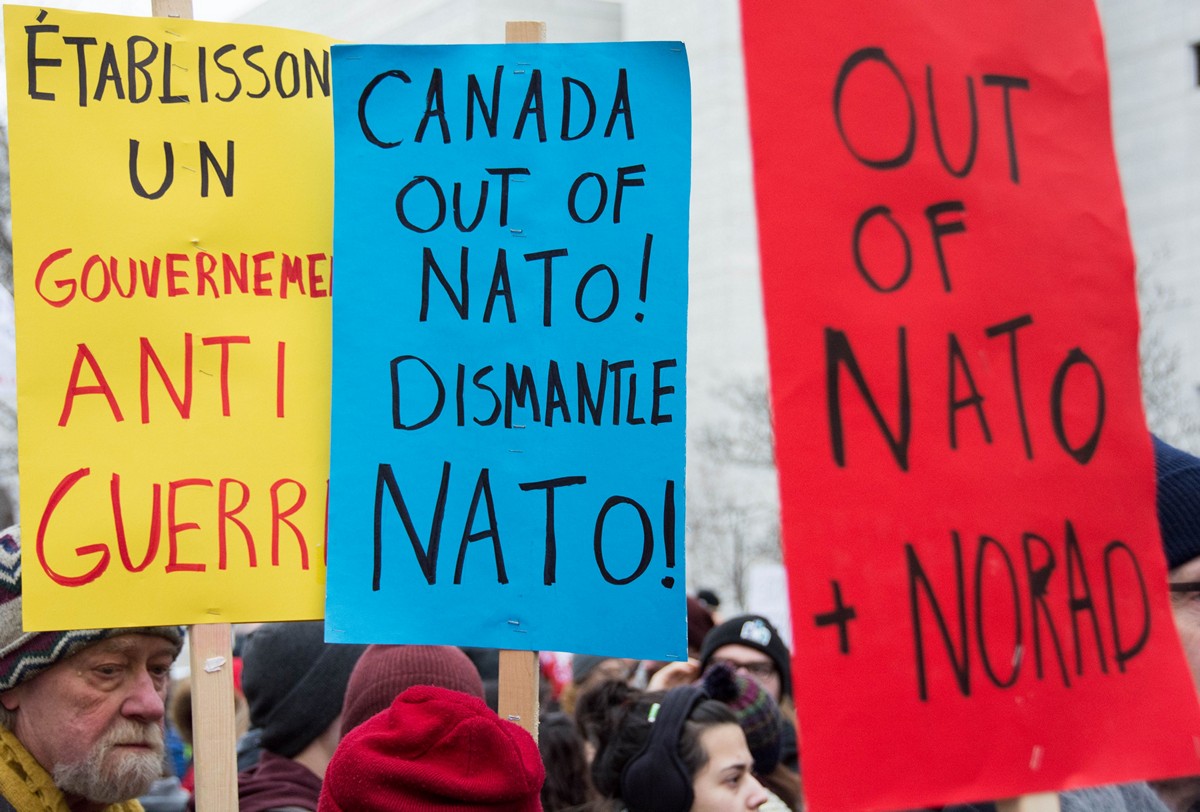 The second option is said to be for
Trudeau to find "common
ground" and appease Trump under the notion that this will be more
effective at accomplishing the goal of the first option. The second option is said to be for
Trudeau to find "common
ground" and appease Trump under the notion that this will be more
effective at accomplishing the goal of the first option.
Based on false ideological beliefs, irrational
discussion
abounds that summarily dismisses the important issues of the need
to uphold rights, including Canada's sovereignty, and to
deliberate within the polity the questions of war and peace.[1]
Canada and its people do not need sideline commentators who are
content to give views and options on the appropriate conduct of
Trudeau towards Trump or on Trump's conduct, outrageous though it
is. Canadians want and need discussion on the important issues
facing the country and world.
The promotion of false ideological beliefs to deprive
the
people of a modern outlook takes the place of analysis of the
unfolding events. An analysis should provide the people with a
guide to action, which arms them to face the dangers that lie
ahead and to turn things around in their favour. Instead of
analysis, the promotion of false ideological beliefs diverts
attention from the fact that what Trudeau is negotiating is the
place of the oligopolies in the New Order Trump says he is
bringing into being. It obscures how problems pose themselves
from the point of view of the working people and their
deliberations to find a way forward that defends their rights and
the rights of all.
The working people and youth of Canada must come
forward
themselves to express the direction they need for the economy and
deliberate on the crucial matters of war and peace. Canadians
need to analyze the unfolding events and inherent dangers from
the perspective of how to advance their own unity in action in
defence of rights and for an anti-war government.
More and more Trudeau, in the autocratic manner of
Trump, says it does not matter what anyone says in Canada, the
decisions are his to take and his alone. He claims he was elected to
take whatever decisions he deems fit and Canadians can do nothing about
this fact of life. He could not be more wrong and Canadians will make
that increasingly clear in the coming year. The more self-serving
pundits claim that Trudeau and Trump have "radically different
approaches," and that one is a "progressive" while the other is a "a
right wing populist and white supremacist," and each stands variously
for "diversity" or "national security," "openness" or "jobs" and
"protectionism" etc, the more life itself and the growing resistance of
the people make it clear that neither is fit to govern.
Note
1. See "Who Said What About Prime Minister's Trip
to Washington"

Step Up the Struggle to Get Canada Out of NATO
and All Other
Aggressive Military Alliances!
- Margaret Villamizar -
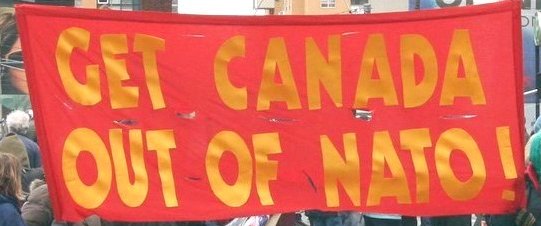
Canadians should beware of deliberate attempts to
divert
their opposition to the Trudeau war government and Trump war
presidency and fight to get Canada out of NATO and dismantle
NATO and NORAD. With the advent of Trump to the U.S. presidency,
a theme first pushed was that it is up to the people to stand
in defence of NATO because Trump will "abandon NATO" and thinks
it is "obsolete." Now the theme pushed is that Trump administration
officials agree with Canada that strengthening NATO is very
important and Canadians should agree to get on board with raising
military spending to two per cent of GDP.
This theme has been used in turn to claim that it is up
to
the Trudeau government to defend the "liberal international
order" in the face of the Trump presidency. It is even suggested
that it is up to Canada to defend "progressive values" and an
"international rules-based system" which is said to include both
the United Nations and NATO. In other words, NATO is presented as
an armed wing of the United Nations and compatible with the
principles of the UN Charter. In fact, this rendering attacks the
UN Charter which recognizes all nations' right to
self-determination and non-interference in their internal affairs
and rejects the use and the threat of force in relations between
and amongst countries -- the polar opposite of what NATO
represents and does.
Canada's government is embracing the Trump
administration's demand for NATO members to "do more" by increasing its
participation in NATO in the name of defending a "rules-based system"
and even an "international order." On February 10, days after Minister
of Defence Harjit Sajjan visited Washington, DC to meet with U.S.
Secretary of Defense James Mattis, the Canadian government announced a
$404 million "upgrade" of Canadian Light Armoured Vehicles (LAVs) to be
used "at home and abroad." This is taking place at a time when NATO and
the U.S. are building up large numbers of troops on a permanent basis
in eastern Europe and the U.S. government is threatening NATO members
to contribute more funding and troops to U.S.-led war and military
preparation.
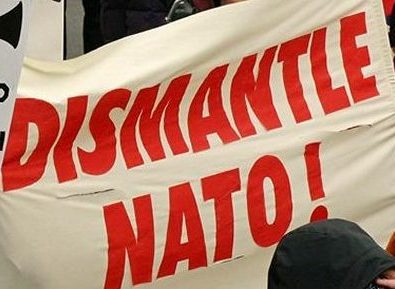 Today NATO represents one
of the greatest threats to peace
and the ability of countries and peoples to sort out differences
on a political, rather than military basis. NATO is and always
has been an instrument of the Anglo-American imperialists to
dictate to other countries what they can and cannot do. It
operates outside of and in complete opposition to the rules and
norms of international law which the peoples of the world created
through their sacrifice in World War II.[1]
Those who claim now that Canada should emerge
as NATO's defender, as if it is part of upholding peaceful
relations between and amongst countries, are participating in a
campaign to further embroil Canada in aggression and war,
including when it is done in the name of opposing Trump's
agenda. Today NATO represents one
of the greatest threats to peace
and the ability of countries and peoples to sort out differences
on a political, rather than military basis. NATO is and always
has been an instrument of the Anglo-American imperialists to
dictate to other countries what they can and cannot do. It
operates outside of and in complete opposition to the rules and
norms of international law which the peoples of the world created
through their sacrifice in World War II.[1]
Those who claim now that Canada should emerge
as NATO's defender, as if it is part of upholding peaceful
relations between and amongst countries, are participating in a
campaign to further embroil Canada in aggression and war,
including when it is done in the name of opposing Trump's
agenda.
Canadians must stand firm in their opposition to the
use of
force in international affairs whether through NATO, United
Nations "peace operations" or in ad-hoc alliances established by
the U.S., as in the case of its war in Syria and Iraq. This is
the basis on which Canadians can establish an anti-war government
that makes a contribution to the cause of peace
internationally.
Note
1. Following World War
II the peoples of the world were united in their opposition to
fascism. They and their governments that fought in the great
anti-fascist war gave rise to the Charter of the United Nations
and established that organization on the basis of the Charter in
1945. No sooner was the United Nations established than the
Anglo-American imperialists sought to re-divide the world, based
on a false dichotomy of democracy and human rights on the one
hand and communism on the other, at a time when communism and, in
particular, the Soviet Union was standing at the head of the
world's peoples' fight for democracy against imperialism, fascism
and colonialism.
NATO was established in 1949 as a military and
political
instrument of this division of the world by the imperialists. It
was an alliance of mainly European countries headed by the United
States and Britain at the time, organized on an anti-communist
basis with the aim of criminalizing the right of the peoples of
the world to chart their own path in economic, political and
military terms and prevent them from marching towards
independence and socialism. NATO was established to destroy the
anti-fascist unity of the world's people and the governments that
defended this position and the world order that rose out of the
ashes of World War II to defend the peace and prevent
aggression.
After the collapse of the Soviet Union, instead of
disbanding, NATO sought a new justification for war and
aggression. In April 1999, NATO adopted a New Strategic Concept
to interfere in the affairs of sovereign countries, claiming a
need to respond to the threat of failing states and to defend
"human security" through force when governments of targeted
countries do not. It was to become a rapid reaction force around
the world to enforce U.S. unipolar domination.
Shortly after, NATO launched a brutal assault on
Yugoslavia
in the name of "protecting civilians" based on spurious claims of
genocide. NATO has continued to adapt as an instrument of
imposing U.S. imperialist hegemony, including on the basis of
resolutions passed at the United Nations Security Council that
violate the UN's own Charter. This was for example the case with
wars against Afghanistan in 2001 and against Libya in 2011. NATO
continues to attempt to create pretexts for war against Syria in
this manner.

Carleton University Students and
Professors
Develop Work in Defence of Rights
Petition Opposes University's Promotion of Use of
Police
Powers to Suppress Speech
The petition launched by Carleton University students
and
professors on February 8 calls on Carleton University to end all
support for the Infrastructure Resilience Research Group (IRRG),
an organization with offices on campus that held a Symposium in
November 2016 called "The Challenges of Dealing with Natural
Resource Development Projects and Activism." The meeting brought
together police and CSIS agents, federal lawyers and judges and
representatives of security and energy monopolies to take part in
workshops on "The Threat Environment," "relevant legal provisions
in the Anti-Terrorism Act," "Industry Perspectives and
Experiences" and "Private-Public Information Sharing" among other
things. According a Globe and Mail report, Martin Rudner,
a "security expert" and co-host of the Symposium, said a main
focus was on "domestic extremists" and pointed to First Nations
protestors in New Brunswick in 2013 and "more militant elements
in the Indigenous and environmental communities."
Situation at Carleton Reflects Trend Towards Use of
Police Powers

Carleton meeting, February 8, 2017, launches petition.
The first speaker at the launch of the petition pointed
out that
Carleton's
sponsorship of criminalization of dissent and the use of the
university to coordinate government and state
institutions, private industry and security firms to align
methods, work out problems and put things into practice reflects the
trend towards police powers as the main form of
governance and the response to people fighting for their rights. This
is most clearly evident in the new U.S. administration with its
barrage of executive orders and promises to use police and
military force against anything it sees as a problem. At
Carleton, the alignment of methods and practices between energy
and security monopolies and state security agencies also means
alignment and coordination with the U.S. security establishment to
which they are tightly joined through the "Five Eyes" spying
alliance under U.S. control and other border and security
arrangements that put security under U.S. control, which the Trudeau
government is increasingly putting in place.
The Strategic Integrated Plan and Strategic Research
Plan
2013-2018, approved by the Carleton University Board of Governors
in June 2013 identify "Infrastructure Protection and Security,"
"Intelligence, security and defense" and "security and
protection" as priorities. Carleton University is already known
for its connections with the Canadian security establishment, the
speaker pointed out, including being home to "Canada's first and
-- still -- only university centre dedicated to research in
Intelligence and National Security Studies," the Canadian Centre
of Intelligence and Security Studies (CCISS) founded shortly
after September 11, 2001." The founder of the CCISS is also
Martin Rudner.
Far from providing a forum where students and academics
can
discuss issues of security, or where genuine investigation can
take place into how society can guarantee security, what security
means and questions such as security for whom, the IRRG is simply
a coordinating body for the police and private interests. It
takes up the crusade against "domestic extremists," "militant
elements of the Indigenous and environmental communities,"
"Islamic extremism," anyone provoking "civil disorder" and other
buzz phrases of political policing that make people targets of
criminalization. It is the antithesis of academic freedom,
freedom of speech, enlightenment or providing solutions to
problems facing society today, the first speaker pointed out.
Those at the university have a right to deliberate on these
matters. To, instead, have the university through the IRRG
making behaviour, speech and political views a criminal matter or
an issue of terrorism is not right.
Students Affirm Their Rights
The speaker pointed out that matters which concern
security,
the environment, and the direction of the economy, as well as all
questions of war and peace belong to everyone. However, they are
told that decisions are made by what are called duly-elected or
appointed representatives and on this basis can be made
without deliberation among Canadians, Indigenous peoples or any
collectives of the people. When people affirm their right to
participate in making the decisions which affect their lives they
are criminalized, called violent, called "disruptors" and blamed
for causing problems.
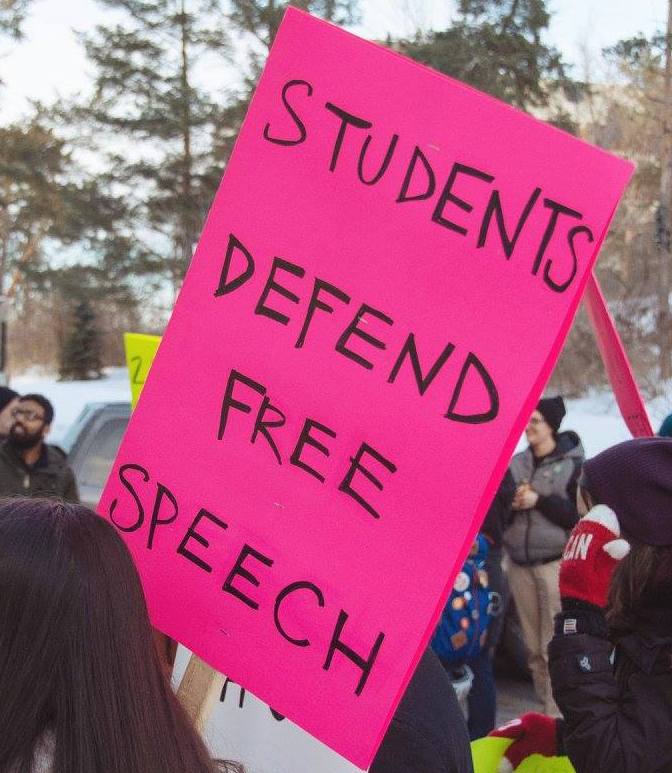 At Carleton when students
and others protested the
November
2016 IRRG Symposium promoting state violence against the people,
the response of the university administration was to say that it
is the protestors who are the ones attacking freedom of speech.
On January 12 Carleton President Roseann Runte sent an open
letter to some members of the Carleton community arguing that
protestors are preventing "duly-elected representatives" and
others from carrying out their mandate and exercising their
freedom of speech. She says among other things, "These noisy
persons fail to recognize that by preventing their duly-elected
representatives to carry out their mandate, they themselves are
contravening the basic principle of a civil society" and argues
"Universities must be home to civil society, welcoming free
speech and allowing others to speak." At Carleton when students
and others protested the
November
2016 IRRG Symposium promoting state violence against the people,
the response of the university administration was to say that it
is the protestors who are the ones attacking freedom of speech.
On January 12 Carleton President Roseann Runte sent an open
letter to some members of the Carleton community arguing that
protestors are preventing "duly-elected representatives" and
others from carrying out their mandate and exercising their
freedom of speech. She says among other things, "These noisy
persons fail to recognize that by preventing their duly-elected
representatives to carry out their mandate, they themselves are
contravening the basic principle of a civil society" and argues
"Universities must be home to civil society, welcoming free
speech and allowing others to speak."
A very suspect anonymous letter circulated to
Carleton's
Board of Governors on February 2 claimed that because of
protestors, students were denied an opportunity to take part in a
"a long-awaited informative event, which would have been of great
interest to a large cross-section of students with background
studies such as business, science, law, social science,
international affairs, journalism, MIPIS, political fields,
security, phycology [sic], safety, public affairs, etc. etc." The
letter went on, describing all the ways that "students" had
suffered in not being able to attend an IRRG event that its own
description stated was directed towards "All those with
responsibility for infrastructure security and resilience policy,
program development and delivery and emergency management."
All of it is covering up that Bill C-51 and the
activities of
the IRRG and the police powers are to criminalize speech and
protest, profile and target all those fighting for their rights, such
as Indigenous peoples,
Muslims and environmentalists,
the first speaker pointed out.
In her letter, Carleton President Runte puts forward a
theory
on the meaning of Rousseau's Social Contract (written in 1762)
and this leads to her "observation" that "At times we see our
democratically-elected representatives unable to do the business
for which they were chosen by the din of those exercising what
they consider to be their right to freedom of speech." Today
questions of security, war and peace, climate and environment,
economy and people's well-being concern everyone -- not abstractly --
and everyone is concerned and wants a say on these
matters. Hiding behind whether officials are "duly-elected" or
appointed to administer an institution, does not negate or take
away from the fact that all members of the polity or of a body
such as a university have the right to deliberate on these
matters. Governments and the institutions of society should be
providing forums for this to take place but instead everything is
being criminalized, from workers' struggles to teachers' struggles,
Indigenous peoples' struggles. Students affirmed that to make such
claims
because of an individual's interpretation of what Rousseau said
254 years ago, and to suggest that the conditions today even
remotely resemble the conditions at the time, is
unacceptable.
All Out to Oppose Criminalization
An Indigenous student leader also addressing the meeting
pointed out that students were defending the freedom of speech to not
be persecuted by government, but that this does not mean keeping quiet
and not opposing what is unacceptable. The IRRG and those involved in
it are attacking Indigenous peoples' freedom of speech when they are
made targets, he pointed out. He noted that the university's rhetoric
about renewing relationships with Indigenous peoples and its
"acknowledgement" of being on unceded Algonquin territory rings hollow
so long as they support criminalization of Algonquin people if they
affirm their sovereignty. He informed that the Carleton administration
is nervous about students' opposition to the IRRG and seeking to meet
with student representatives about the issue at the end of February.
A professor attending noted that the students have made
an
important distinction on the questions of academic freedom and
freedom of speech. He pointed out that the issue with the IRRG is
Carleton's institutional support and backing for the group, not
the beliefs or actions of any professors or instructors. He
informed that professors are bringing a motion to their
organization, the Carleton University Academic Staff Association
to call on the university to clarify that it does not support
criminalization of protestors and activists.
The final speaker, a member of Students Against Israeli
Apartheid-Carleton, gave an overview of the history of Carleton
University attacking students' freedom of speech when they
organize in defence of the rights of the Palestinian people.
Examples include the banning of a poster advertising Israeli
Apartheid Week events in 2009, and the stubborn refusal of
Carleton's Board of Governors for years to allow any discussion
of Carleton pension plan investments in companies complicit in
the occupation of Palestinian territories. He called on students to go
all out in support of this new initiative and gave suggestions based on
the work that Carleton students have done in defence of Palestine over
the course of many years.
Many students at the meeting then gave their views on
the
issue and suggestions for how to make the petition and students'
demands a success. The meeting concluded by noting that the best
response of everyone to what is taking place at Carleton and more
broadly in Canada is to go all out to end Carleton's support for
the IRRG and deal with this critical issue facing the polity.
The petition points out, "The Symposium is the
first
known instance in Canada of state agencies, private security or
representatives of the oil and gas sector proposing the use of
powers in the widely-opposed Bill C-51 against protesters and
activists." Another Conference organized by the IRRG in May in
Toronto will focus on bringing together "Leaders of the security
and intelligence community; financial and insurance community;
commercial building owners and managers; leaders of the law
enforcement community; civic leaders (local/regional/national);
[NGOs]; [and] corporate leaders" to "develop new strategies to
fight against extremists, violent civil disorder and
terrorism/counterterrorism." Ralph Goodale, Minister of Public
Safety has been invited as keynote speaker.
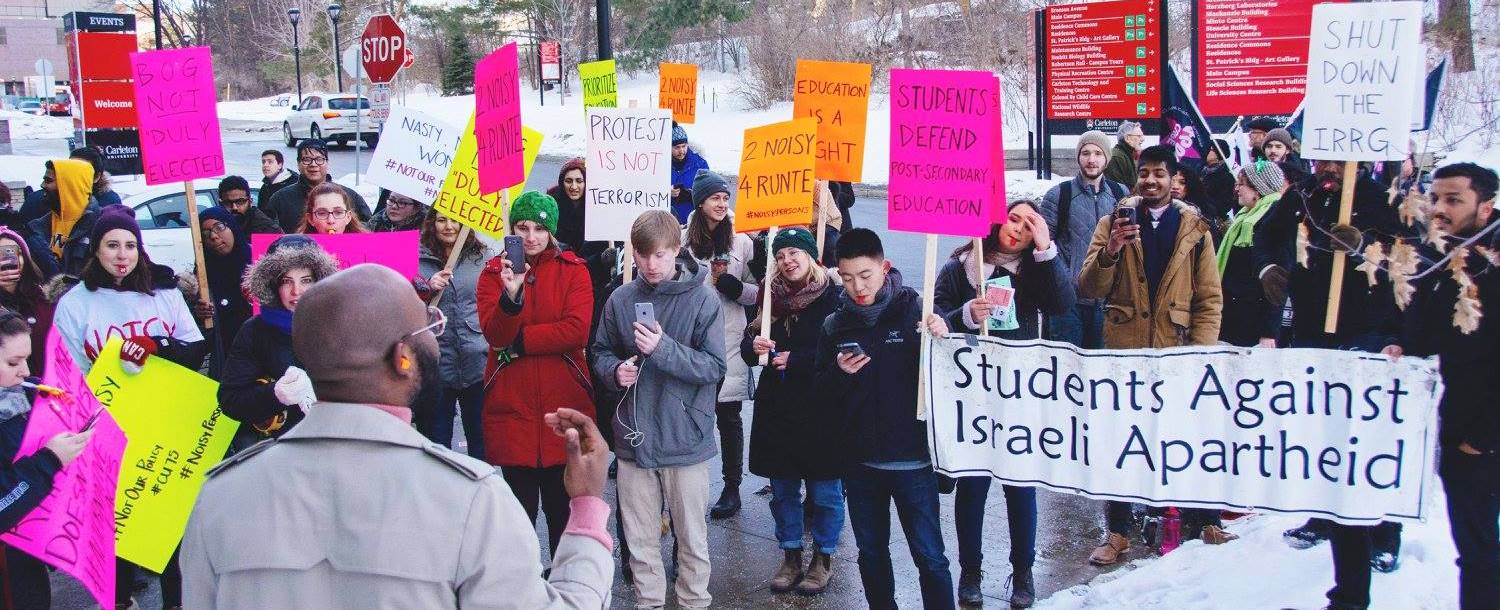
 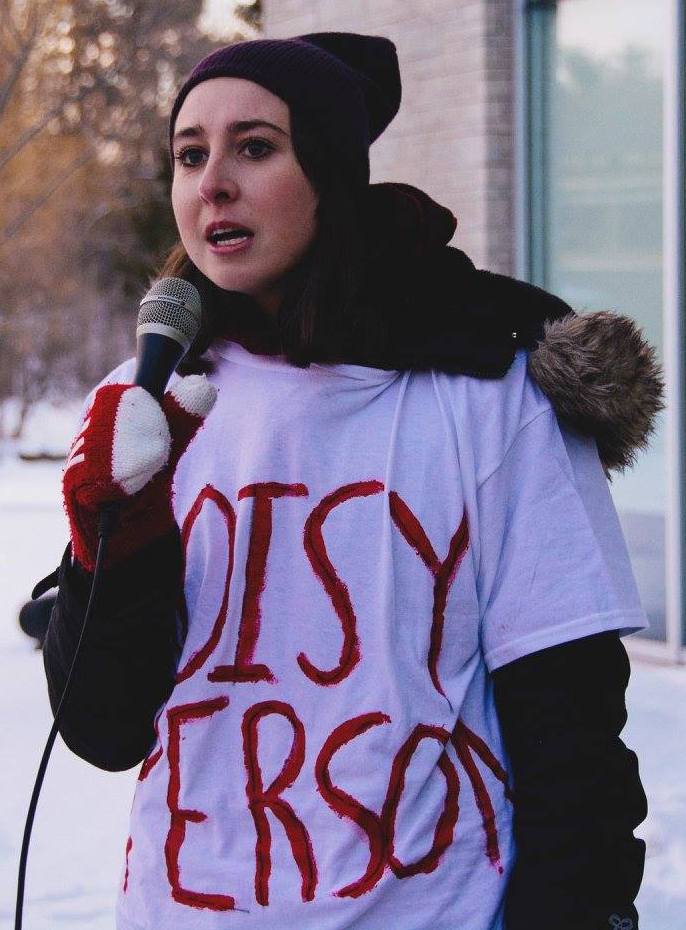 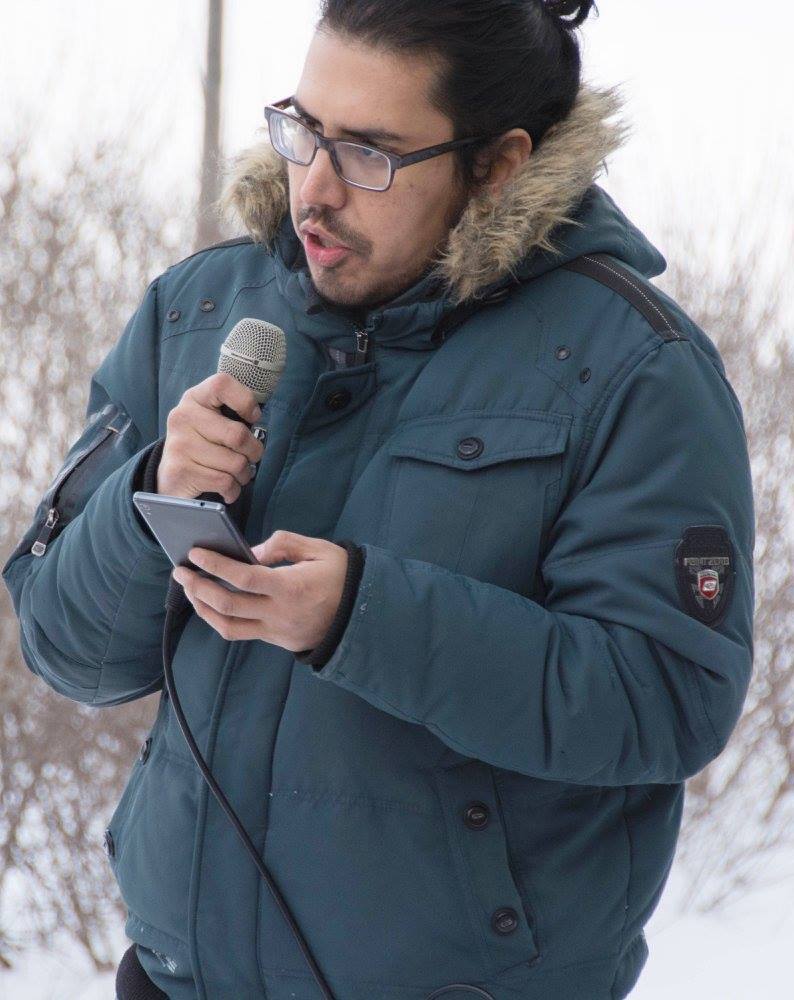
Students protest outside meeting of the Carleton
University Board of
Governors (BoG), the university's highest decision-making body on
February 2. The Carleton BoG is primarily
comprised of appointed
individuals representing private business interests or government,
including Michael Wernick, Clerk of the Privy Council. Students opposed
the BoG's decison to increase tuition fees by the maximum legal amount
for the next two years, opposed the sexual violence policy adopted by
the university against the wishes of those advocating on the issue,
called on Carleton to shut down the IRRG and denounced statements of
Carleton's President Roseann Runte against protestors and the right to
freedom of speech.

End Carleton University's Support to Group Promoting
Use of
Bill C-51 Against Protesters
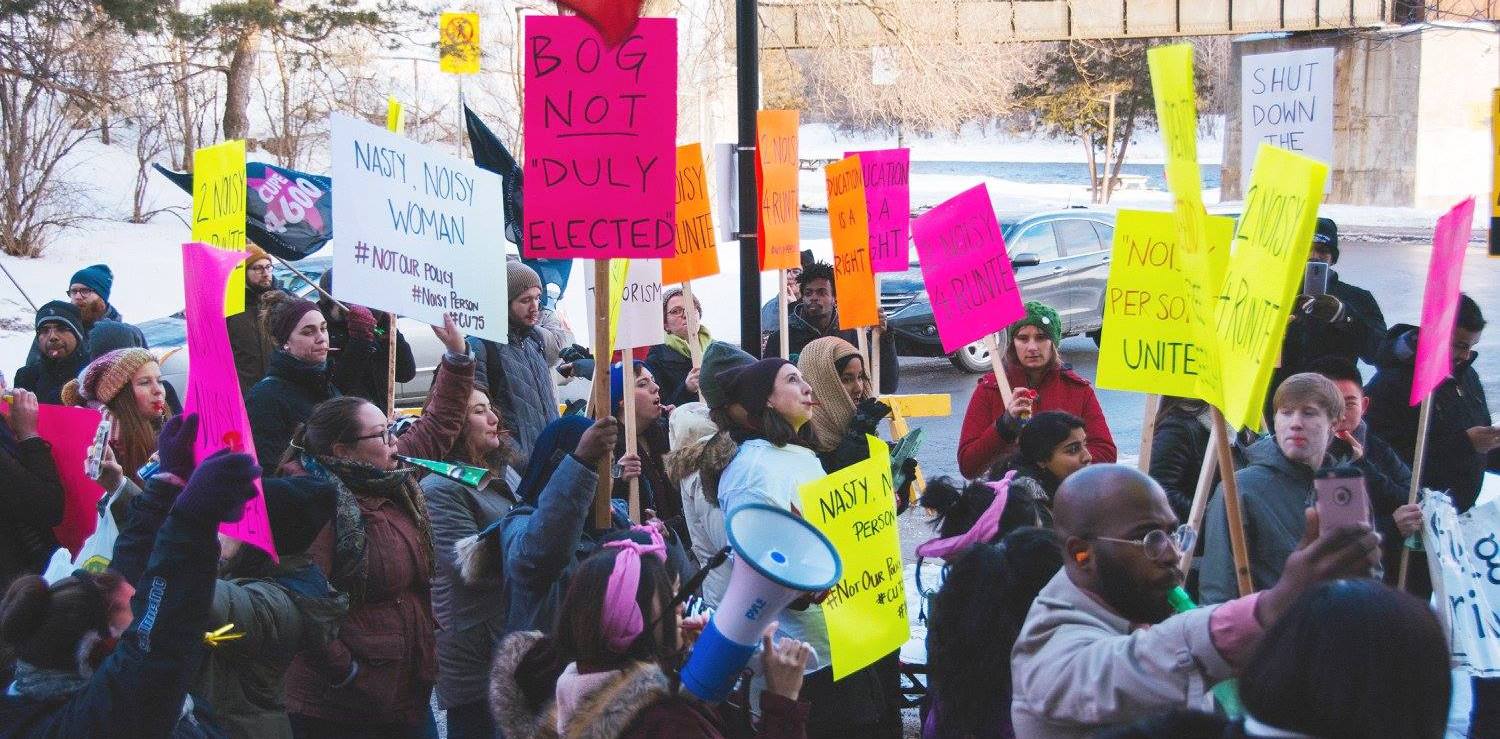
Open Letter to the Carleton Community
and
Administration on the
Infrastructure Resilience Research Group
(IRRG)
To view and sign the petition online, click
here.
Introduction
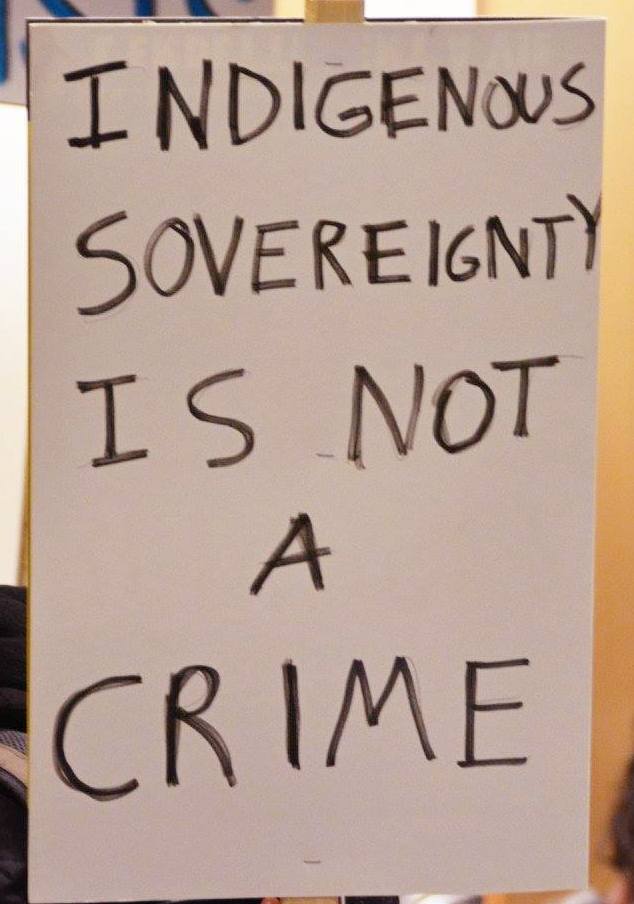 On November 14 and 15
Carleton University and its
Infrastructure Resilience Research Group (IRRG) sponsored a
Symposium on "The Challenges of Dealing with Natural Resource
Development Projects and Activism." The event brought together
"prosecutors, lawyers, regulators, law enforcement, industry and
industry association representatives" in workshops on "the threat
environment, relevant legal provisions in the Anti-Terrorism
Act [Bill C-51] and other pertinent elements of the criminal
code, the prosecutorial experience in cases involving violent
acts targeting critical national infrastructure, the adjudication
record, and overall lessons learned." A main target of the
Symposium was Indigenous peoples exercising their right to decide
over energy and resource development projects on their
territories (See Background). On November 14 and 15
Carleton University and its
Infrastructure Resilience Research Group (IRRG) sponsored a
Symposium on "The Challenges of Dealing with Natural Resource
Development Projects and Activism." The event brought together
"prosecutors, lawyers, regulators, law enforcement, industry and
industry association representatives" in workshops on "the threat
environment, relevant legal provisions in the Anti-Terrorism
Act [Bill C-51] and other pertinent elements of the criminal
code, the prosecutorial experience in cases involving violent
acts targeting critical national infrastructure, the adjudication
record, and overall lessons learned." A main target of the
Symposium was Indigenous peoples exercising their right to decide
over energy and resource development projects on their
territories (See Background).
Sponsorship of the IRRG and events such as the
Symposium run
counter to Carleton's self-professed respect for Indigenous
students and Indigenous peoples. It further runs counter to the
university as a place where political matters can be discussed
and not criminalized. Carleton University must apologize to
Indigenous students and end all support for the Infrastructure
Resilience Research Group.
Demands
To ensure that our campus is not further implicated in
unacceptable activities such as those of the IRRG Symposium, we,
the undersigned students, faculty, staff, and community members
call on Carleton University to immediately:
1. Apologize for sponsoring the "2016 Symposium on
Security
and Infrastructure Resilience," the Dean's Lecture on November 15
and for allowing the event to take place on the traditional,
unceded territories of the Algonquin nation.
2. Disclose relevant information about the IRRG
including: a.
Funds Carleton University has directed towards the organization;
b. Public or private funds that Carleton University has received
to support the organization; c. Corporate or state partners in
the organization.
3. Cease all funding towards the IRRG, and cease
accepting
any funds including from corporate donors in the name of
supporting the IRRG.
4. Cease rental of 310 Minto Centre to the IRRG and
offer the
space to Indigenous students to decide on a suitable alternative
purpose.
Background
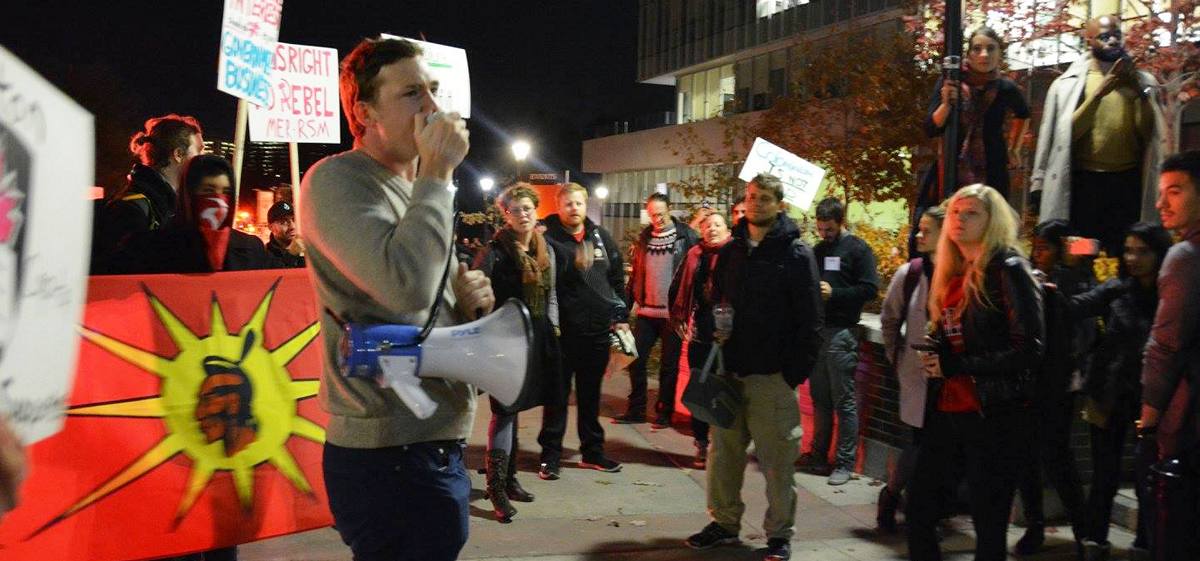
Protest by Carleton students outside closing lecture of IRRG
symposium, November 15, 2016.
The Symposium is the first known instance in Canada of
state
agencies, private security or representatives of the oil and gas
sector proposing the use of powers in the widely-opposed Bill
C-51 against protesters and activists. Adopted by the
Conservative government in 2015, Bill C-51, Anti-terrorism
Act, 2015 changed the
mandate of the Canadian Security
Intelligence Service (CSIS) from intelligence collection to
"disrupting" alleged "threats to the security of Canada" and
expanded information sharing, among other things. It was widely
opposed by Canadians and Indigenous peoples who pointed out the
dangers of these powers being used to criminalize protest and
political activism and to target Muslims and other groups.
 Students protested the
closing Dean's Lecture of the
Symposium on November 15. They pointed out that in the context of
the brutal violence being used against Indigenous people at
Standing Rock, North Dakota opposing the Dakota Access Pipeline
(DAPL) and similar cases in Canada, it is unacceptable for the
university to sponsor or allow such events. Martin Rudner, one of
the Symposium organizers and a "Distinguished Research Professor
Emeritus" at Carleton told the Globe
and Mail on November 14 that
Indigenous people exercising their sovereignty or protesting was
one of the main concerns of the event. Students protested the
closing Dean's Lecture of the
Symposium on November 15. They pointed out that in the context of
the brutal violence being used against Indigenous people at
Standing Rock, North Dakota opposing the Dakota Access Pipeline
(DAPL) and similar cases in Canada, it is unacceptable for the
university to sponsor or allow such events. Martin Rudner, one of
the Symposium organizers and a "Distinguished Research Professor
Emeritus" at Carleton told the Globe
and Mail on November 14 that
Indigenous people exercising their sovereignty or protesting was
one of the main concerns of the event.
Carleton University has responded by trying to cover up
its
sponsorship of criminalizing activism. After the protest,
Carleton removed all mention of the event from its website and
large portions of the IRRG website, including details of
individuals, companies and agencies affiliated with the program,
including Martin Rudner. Carleton also temporarily removed the
website of the Canadian Centre for Intelligence and Security
Studies (CCISS), an organization founded by Rudner. According to
students present at the November 15 event, which Rudner
moderated, he falsely accused students of being violent and made
a racist statement that the IRRG is working to "protect
Aboriginals from themselves."
Carleton University describes itself as a "noted centre
for
Aboriginal learning and innovative research" that has "been
increasingly active in advancing Aboriginal initiatives in recent
years." In November 2011 Carleton adopted an Aboriginal
Co-ordinated Strategy "to emphasize its commitment to engaging
Aboriginal students, faculty, staff and communities." Carleton
announced it is "dedicated to welcoming more Aboriginal students
and faculty to campus while increasing community partnerships."
Since then Carleton has said it officially "acknowledges the
location of its campus on the traditional, unceded territories of
the Algonquin nation" and many important initiatives have been
launched on campus including Ojigkwanong, a centre for Indigenous
students and new degree programs.
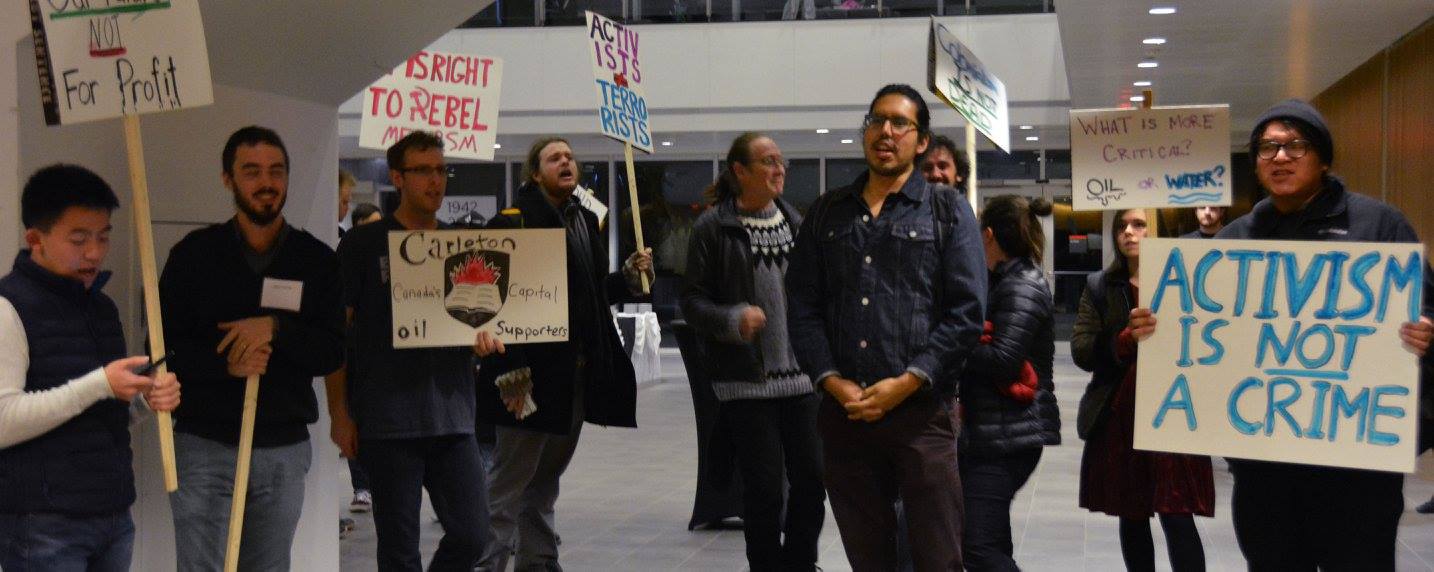

Carleton University's Infrastructure Resilience
Research
Group
Carleton University's "Infrastructure Resilience
Research Group" was
founded in
2013 by the Dean of Engineering and Design and Dean of Public
Affairs. It describes its role as "to advise and promote
interdisciplinary knowledge-building initiatives regarding risks
and vulnerabilities pertaining to Critical National
Infrastructure in an all-hazards environment, including threat
assessments, managerial precepts and risk management solutions." The
link from the website to the full "Conceptual Framework" for the group
is password-protected. The establishment of the IRRG
relates to Carleton's Strategic Integrated Plan and Strategic
Research Plan 2013-2018, approved by the Carleton University
Board of Governors in June 2013. The Strategic Research Plan
identifies as a priority "Infrastructure Protection and
Security," "Intelligence, security and defense" while the
Strategic Integrated Plan describes one aspect of Carleton's
"unifying theme, 'Sustainable Communities -- Global
Prosperity,'" as "security and protection."
Carleton is already known for its affiliations with the
Canadian security establishment. For instance, Carleton is home
to "Canada's first and -- still -- only university centre
dedicated to research in Intelligence and National Security
Studies," the Canadian Centre of Intelligence and Security
Studies (CCISS) founded shortly after September 11, 2001. The
CCISS says that "By virtue of its location at Carleton University
and in the national capital [it] is excellently positioned to
help generate national synergy and knowledge building between
academics, practitioners and other stakeholders sharing an
interest in Intelligence and Security Studies." CCISS was founded
by Martin Rudner at the Norman Paterson School of International Affairs
(NPSIA) out of an already-existing NPSIA unit called the Centre
for Security and Defence Studies. At least two of the main
figures in the IRRG, Martin Rudner and Angela Gendron (managing
editor of the IRRG journal) come out of the CCISS.
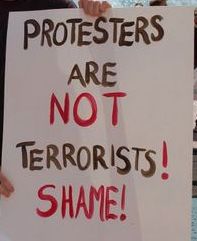 The IRRG was established at
Carleton because of such features as an arrangement between the
government and state institutions -- from police to intelligence to the
judiciary -- and private industry and security firms to align their
methods, work out problems and put things into practice. The IRRG was established at
Carleton because of such features as an arrangement between the
government and state institutions -- from police to intelligence to the
judiciary -- and private industry and security firms to align their
methods, work out problems and put things into practice.
The main activities of the IRRG are Symposia and
Conferences
on particular issues that the security establishment and energy
companies are pushing. The IRRG is clear about who its events and
activities are directed towards. For instance, the November 2016
IRRG Symposium declared that it was "designed for prosecutors,
lawyers, regulators, law enforcement, industry and industry
association representatives who must deal with natural resource
development projects and protests targeting critical
infrastructure." An IRRG Conference to be held in May in Toronto
that says it is "bringing together leading experts from around
the world to develop new strategies to fight against extremists,
violent civil disorder and terrorism/counterterrorism" lists the
following as "Who Should Attend:" "Leaders of the security and
intelligence community; Financial and Insurance Community;
Commercial Building Owners and Managers; Leaders of the
law-enforcement community; Civic leaders
(local/regional/national); Non-governmental agencies; Corporate
leaders."
Its November 2016 Symposium in Ottawa, "The Challenges
of
Dealing with Natural Resource Development Projects and Activism,"
featured a former CSIS Assistant Director, lawyers including the
Senior General Counsel for the Department of Justice, CEOs and
other executives in private security and "threat and risk
consulting" firms, a Director of the Canadian Gas Association, a
Vice-President of the Canadian Energy Pipeline Association, the
Director of Corporate Security for Irving Oil and the former
Assistant Commissioner of the RCMP. After students opposed the
Symposium, the event itself and other information such as individuals
affiliated with the IRRG were removed from the Carleton University
website. The Agenda for the November 2016 Symposium can be found here.
To muddy the waters, the IRRG conflates things like
weather
forecasting for purposes of protecting electrical grids and other
infrastructure, or techniques to prevent technical failure of
certain infrastructure, with "protection" of things like
pipelines and large development projects from political
opposition and targeting "extremists." To point out this aspect
of the IRRG has also been a response of university administrators
to dismiss the concerns of students.
The IRRG's Martin Rudner
Martin Rudner, a Professor Emeritus at Carleton
University,
is one of only two Carleton professors identified as being
associated with the IRRG, the other being an adjunct professor
who primarily works as a Director of Energy Infrastructure
Security for Natural Resources Canada, Felix Kwamena. Besides
Deans, the other individuals who were identified as part of the
IRRG before the information was removed from the Carleton
University website are representatives of state intelligence
agencies, government and private industry and security firms.
Rudner was co-host, with Kwamena, of the November 2016 IRRG
Symposium. When students protested the Symposium on November 15,
Rudner called them "violent" and dismissed their concerns about
criminalization of Indigenous peoples. According to students
present, Rudner replied that the IRRG is trying to protect
Aboriginals from themselves.
Rudner is a "security expert" frequently quoted in
monopoly-owned media. He habitually claims that Canadian energy
and resource developments are threatened by so-called Islamic
terrorists. In a November 14, 2016 Globe and Mail article
Rudner claimed "there is evidence in some cases that
foreign governments -- including Iran -- have supported groups
that oppose Canadian resource projects." In October 2014 he told
the Vancouver Observer, "It's clear to me that the
Islamic State is aiming to harm the oil economies of Western
countries ... as part of its strategy for economic jihad..." In
July 2012 Rudner told the Toronto Sun that Al Qaeda has
identified Canadian oil production as a target. "The real
protection isn't passive defence -- armed guards at refineries
--
it's proactive use of intelligence and law enforcement," he said.
"You I.D. the people who pose a threat," he said.
Rudner was also the sole "expert" government witness
against
Mohamed Harkat in a 2010 challenge to the constitutionality of
Security Certificates -- a system of secret trials and detention
used against non-citizens. An alleged expert in terrorism trained
at an Israeli university as a specialist on Indonesia and
Malaysia, he gave testimony on individuals in Saudi Arabia which
the government said supported its bogus case against Harkat.
Another witness, Professor Brian Williams, who taught Islamic
History at the University of Massachusetts, called Rudner's
testimony "outlandish," "staggering" and "inconceivable." The
judge in the 2010 security certificate case, who upheld the
constitutionality of the system, was Simon Noel, a fellow
panelist alongside Rudner at the November 15 IRRG event that
students protested.
As an alleged specialist on Indonesia, Rudner appeared
in Canadian media to express support for the anti-communist military
dictatorship of Suharto which held power from 1968 to 1998 after a
U.S.-backed coup. Appearing on CBC Radio in 1996 during a visit by one
of Jean Chrétien's "Team Canada" trade junkets to Indonesia,
Rudner addressed the massacres committed in East Timor as well as the
millions killed by the Indonesian armed forces and CIA-supported
anti-communist death squads in 1965-66. The first
he justified by saying that in East Timor (population one
million) "a Marxist party" held power that "threatened in fact,
by implication, neighbouring Indonesia" (population 250 million).
The second he said resulted from the fact that there was a "rural
uprising" and an "attempted communist coup" but that ethnic
Chinese, who he said were a target, have now "prospered
financially, have prospered socially, have prospered in family
terms."
Other IRRG Affiliates
Among those involved with the IRRG, according to pages
removed from Carleton University's website in November 2016,
are:
- Paul
Adams, President of Newfoundland Transhipment Ltd, an
operator of oil
tankers.
- Jean-Philippe
Caron, Executive Director of Security
Operations (SECOPS) at the
Privy Council Office and its Departmental Security Officer.
- Tiago De Jesus,
listed
as
an
IRRG
Associate
and
member
of
the
Office
of
the
Dean
of
the
Faculty
of
Engineering
and
Design
at
Carleton.
De
Jesus
is
also
a Civilian Expert
for NATO's "Rapid Response Team" and a former RCMP National Security
program
specialist.
- Connie Delisle,
a
member
of
the
Privy
Council
Office
Security
Operations
Division.
- Rick Garber,
Group
Leader
of
Security
and
Business
Integration
at
the
National
Energy
Board.
- Gaétan
Houle, Associate Partner, Advisory Services at
Ernst & Young LLP, one
of the "big four" neo-liberal accounting firms with a revenue of $30
billion annually.
- Ross Johnson,
Senior
Manager
of
Security
and
Contingency
Planning,
Capital
Power
Corporation.
- Alan Jones,
former
Assistant
Director
of
CSIS.
- Raynald
Lampron, Director of Operations at the Office of the
Public Sector
Integrity Commissioner of Canada.
- Michael Martin, President of the Valley Associates
Group, one
of Canada's largest
private defence and security contractors.
- Tim O'Neil, Associate
at
the
private
firm
Oldcastle
Security
Consulting
Inc.
and
a
former
CSIS
officer.
- John
Patterson, an active officer with CSIS and CSIS lead
for the "semi-annual
Classified Briefings for Energy Stakeholders."
- Doug Powell, Manager
of
Smart
Metering
Security,
Privacy
and
Safety
for
BC
Hydro.
- Paul Rietdyk,
Vice-President
of
Engineering,
Construction
and
Storage
and
Transmission
Operations
for
Union
Gas
Ltd.
- Sharon
Savoie, head of Savoie Security Associates, which
runs private training
courses on behalf of the IRRG.
Upcoming Conference -- "2017 Urban Security and
Resilience Conference, Workshop, and Exhibition"
A Conference to be hosted by the IRRG in Toronto from
May 16
to 19 makes clear that this aspect of the IRRG -- to overcome
technical problems or prevent failure of various infrastructure
systems -- is secondary or a cover for its main role in
coordinating between security forces and private interests. The
"2017 Urban Security and Resilience Conference, Workshop, and
Exhibition: New Realities - New Strategies" notes, "A new
administration in the United States, and the deadly attack at a
Quebec, City (Canada) Mosque have added new layers of complexity
to an already changing urban security landscape."
The IRRG describes the upcoming event as "A major
international conference, the first-ever of its kind, [that] will
bring together leading experts from around the world to develop
strategies to fight against extremists, violent civil disorder
and terrorism/counterterrorism." It is "expected to attract 1,200
representatives of the security, intelligence and law enforcement
communities, public and private security practitioners, senior
government officials, community and corporate leaders,
non-governmental agencies, and academia."
The IRRG lists the following as "Who Should Attend":
- Leaders of the security and intelligence community;
Financial and Insurance Community; Commercial Building Owners and
Managers; Leaders of the law-enforcement community; Civic leaders
(local/regional/national); Non-governmental agencies; and Corporate
leaders.
The cost of registration is $795 (early bird special),
$895 (regular), $1095 (late) and $1195 (last minute).
According to the Conference program, Canada's Minister
of Public Safety Ralph Goodale has been invited as the keynote speaker.
Other speakers include:
- Richard
Fadden, Former Director, Canadian Security
Intelligence Service, and
Former National Security Advisor to the Prime Minister of Canada;
- Alan Jones,
Assistant
Director
(rtd),
Canadian
Security
Intelligence
Service;
- Paul
Goldenberg, Chairman and CEO, Cardinal Strategies,
member of U.S.
Homeland Security Advisory Council;
- Anna Carlstedt,
National
Coordinator,
Swedish
Government
Office
to
Safeguard
Democracy
Against
Extremism;
- Anne Speckhard,
Adjunct
Associate
Professor
of
Psychiatry,
School
of
Medicine,
Georgetown
University,
and
Director,
International
Centre
for
the
Study
of
Violent
Extremism;
- Giuliano
Zaccardelli, Commissioner (rtd), Royal Canadian
Mounted Police;
- Judge Leonie
Brinkema, U.S. District Court for Eastern
District of Virginia;
- Malcolm
Chivers, Director, Corporate Security, Canadian
Bankers
Association;
- Michael
Masters, Director (rtd), Cook County, Office of U.S.
Homeland
Security;
- Rafik Goubran,
Acting
Vice
President,
Research
and
International
Affairs,
Carleton
University;
- Chief Justice
Richard Bell, Court Martial Appeal Court of
Canada;
- Roger Brown,
Assistant
Commissioner
(rtd),
Royal
Canadian
Mounted
Police;
- Tim Egan,
President & Chief Executive Officer, Canadian
Gas Association.
To read the program as of February 3, click here.
Private Sponsorship
In conjunction with its upcoming Conference, the
Carleton IRRG is selling sponsorship packages to the organizations
involved. According to a document on the IRRG web site called
"Sponsorship Levels," a $100,000 contribution will result in a
company's name and logo being displayed prominently at the Conference,
the company's promotional items being distributed, a showcase at the
exhibition portion of the event, 15 minutes of guaranteed speaking time
for a company representative and other perks.
There are smaller packages for $80,000, $60,000 and so
on, down to $8,000 for acknowledgement at a dinner and $1,500 for
acknowledgement at a breakfast.
Students and professors at Carleton University are
asking for
answers as to the nature of this private funding. All indications
are that a university body is soliciting private corporate and
perhaps state funding in exchange for guaranteed promotion.
Neither Carleton nor the IRRG state their financial relationship
to one another, whether Carleton funds the IRRG or the IRRG
solicits private funding on behalf of Carleton.
To read about the Carleton IRRG's private sponsorship
packages, click
here.

What Comprises Critical Infrastructure?
- Sam Heaton -
According to the Mission Statement of the
Infrastructure Resilience Research Group (IRRG) at Carleton
University, government policy has defined ten critical
infrastructure sectors: energy and utilities, finance, food,
health, information and communication technology, manufacturing,
public safety, transportation, water, and government. "These
infrastructures are increasingly interconnected and
interdependent, making them more vulnerable to disruption or
destruction by natural or man-made threats," the Mission
Statement says.
This definition mirrors U.S. measures and integrated
approaches to "critical infrastructure." Canada has since
September 11, 2001 adopted 10 distinct bills dealing with
terrorism-related offences including Bill C-51 in 2015 which had
five Acts within it. One aspect of this has been harmonizing the
concepts and approach related to "critical infrastructure" with
the U.S., something done by all the "Five Eyes" countries that
share intelligence with the U.S. and among themselves (U.S., UK,
Canada, Australia, New Zealand).
An example of how this plays out in practical terms can
be
found in a cable from the U.S. Embassy in Ottawa to Washington
from November 2005 published by Wikileaks. It noted that the
Ambassador Bridge and Detroit Tunnel from Windsor to Detroit are
"arguably the two most significant pieces of critical
infrastructure along the entire frontier," carrying around 25 per
cent of all Canada-U.S. merchandise trade. Their designation as
"critical infrastructure" make any obstruction, whether from the
Canadian side, by Indigenous peoples or otherwise, a threat to
U.S. national security.
The Department of Homeland Security defines critical
infrastructure as what "provides the essential services that
underpin American society and serve as the backbone of our
nation's economy, security, and health. We know it as the power
we use in our homes, the water we drink, the transportation that
moves us, the stores we shop in, and the communication systems we
rely on to stay in touch with friends and family."
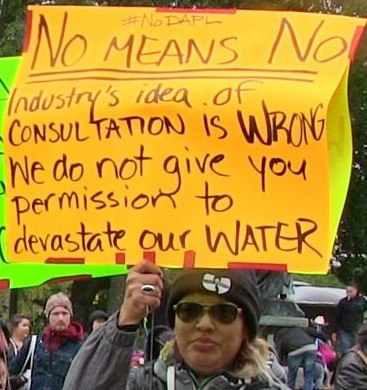 This definition is
self-serving and does not hold up to
scrutiny. Those heroically resisting at Standing Rock, North
Dakota are doing so both in defence of treaty rights and
sovereignty but also because the development threatens to impact
clean water resources for themselves and future generations. The
proposed course of the Dakota Access Pipeline had already been
moved because the community it was to pass through objected to
dangers to their water supply, but Indigenous people were
considered an acceptable casualty. The protests at Muskrat Falls
in Labrador had the same concern. This definition is
self-serving and does not hold up to
scrutiny. Those heroically resisting at Standing Rock, North
Dakota are doing so both in defence of treaty rights and
sovereignty but also because the development threatens to impact
clean water resources for themselves and future generations. The
proposed course of the Dakota Access Pipeline had already been
moved because the community it was to pass through objected to
dangers to their water supply, but Indigenous people were
considered an acceptable casualty. The protests at Muskrat Falls
in Labrador had the same concern.
In Canada there are 130 drinking water advisories among
nearly 90 First Nations. In July 2015, the number was at 133
advisories among 93 First Nations. Justin Trudeau, during the
2015 election campaign said he would ensure that all the
advisories are ended before the next election but after one year
there has been virtually no progress. There are many examples of
infrastructure that is critical to the health and well-being of
the people and the guarantee of their economic, social and
cultural rights which are not provided let alone given protection
by the state and powerful private interests. When it comes to the
question of security, Canadian steelworkers who protested against
Bill C-51 had the slogan, "What about my pension security?"
For more than 40 years, the people of the
Asubpeeschoseewagong or Grassy Narrows First Nation, north of
Kenora, Ontario have suffered from a contaminated water supply
resulting from the dumping of thousands of kilograms of mercury
into river systems by the company that operated a paper mill in
nearby Dryden, Ontario. Hundreds of residents have suffered
mercury poisoning including permanent damage to infants. The
livelihoods of the people, closely tied to fishing and hunting and
tourism in the area, have been ruined. A 2005 study found that 79
per cent of 175 people tested in the area between 2002 and 2004
had or may have methylmercury poisoning. The majority have
received no compensation and no cleanup has been done to
date.
In the 1980s, scientists estimated the cost of cleanup
via dredging a river at approximately $200 million but no action has
been taken to date. Grassy Narrows First Nation Chief Simon Fobister
issued a call to Prime Minister Trudeau on January 17 for his
government to "clearly commit in writing to clean our river until our
fish are safe to eat." The response of the government was to deny
responsibility, saying that the mill, the source of the poisoning, was
not on federal lands. Trudeau's response when questioned during a "town
hall" in Fredericton, New Brunswick in January was considered to be
totally aloof and uninterested by many. "We're working with the
province on resolving this issue. My government is committed to ending
boil water advisories across this country," Trudeau said.
Fobister said in response, "I'm very frustrated that
two
levels of government don't take the extra step further to say,
after the study, we're committed to cleaning it up, no matter
what the costs. [...] I know both levels of government are very
supportive of other major industrial activity, like the building
of pipelines," he said. "But their credibility suffers at this
moment when they haven't even cleaned up this contamination that
was caused by industrial activity."
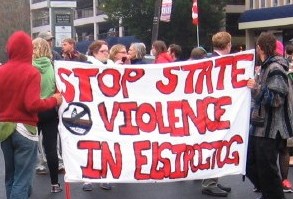 Instead, the main examples
of "critical infrastructure" that are given "protection" are enormous
resource development projects such as the $9 billion Site C Dam and the
$11.4 billion Pacific NorthWest LNG project in British Columbia and the
$3.7 billion Dakota Access Pipeline in the U.S. The common factor is
that they
are not critical for the people's well-being, a country's energy
needs or even the overall health of the economy. They are the
subject of massive state and private investment which demands the
use of police powers to guarantee the success of the project and
the profit from its transportation and sale overseas, including
to overcome opposition. Instead, the main examples
of "critical infrastructure" that are given "protection" are enormous
resource development projects such as the $9 billion Site C Dam and the
$11.4 billion Pacific NorthWest LNG project in British Columbia and the
$3.7 billion Dakota Access Pipeline in the U.S. The common factor is
that they
are not critical for the people's well-being, a country's energy
needs or even the overall health of the economy. They are the
subject of massive state and private investment which demands the
use of police powers to guarantee the success of the project and
the profit from its transportation and sale overseas, including
to overcome opposition.
Police Powers Provide the Definition
The phrase "critical infrastructure" is not defined in
Canadian law. Its definition is given through the executive power
through ministerial regulations or documents most notably from
Public Safety Canada.
The term "Critical Infrastructure" was relatively
marginal
and only beginning to be discussed in Canada before 9/11. A
report on a November 2000 conference called "Future Directions
for Critical Infrastructure Protection for Canada" in the Spring
2001 issue of The Journal of Conflict Studies noted the
concern that Canada should have a national strategy for "critical
infrastructure protection." In February 2001 the Jean Chrétien
government created the Office of Critical Infrastructure
Protection and Emergency Preparedness, comprised of Emergency
Preparedness Canada, a Critical Infrastructure Protection Task
Force and the Government Information Protection Coordination
Centre.
Margaret Purdy, Deputy Secretary to the Cabinet for
Security and Intelligence in the Privy Council Office from the late
1990s until 2001 and Associate Deputy Minister of the Department of
National Defence from 2001 to 2003, led the creation of the Office of
Critical Infrastructure Protection and Emergency Preparedness. At that
time the government and other players were still working out how to
view the issue of Critical Infrastructure. In November 2000 Purdy was
asking the "Future Directions" conference questions such as:
"How do we engage the private sector in CIP? Is there a
role
for auditors and the insurance industry in motivating key
players? How do we get government and business to think on 'Internet
Time' so they will respond quickly to the fast-changing
threat and vulnerability environment? How do we approach the
challenge of collecting intelligence on individuals and groups
who might attack Canada's CI? How should we characterize CIP --
as a security and intelligence issue, a technology or economic
issue, or as an emergency planning issue? Will we be able to
achieve the necessary level or horizontal cooperation to meet the
CIP challenge?"
 At that time the issue of
how to characterize protests
was
also being discussed. Tim Smith, a CSIS agent said at the
conference that the "three broad threats" to critical
infrastructure were "espionage/sabotage; terrorism;" and what he
called "Hacktivism." The latter, he claimed, was the "most common
cyber threat, as demonstrated by the recent demonstrations
against 'Globalization,' which were mobilized in part by
information-sharing among activist groups on the net." At that time the issue of
how to characterize protests
was
also being discussed. Tim Smith, a CSIS agent said at the
conference that the "three broad threats" to critical
infrastructure were "espionage/sabotage; terrorism;" and what he
called "Hacktivism." The latter, he claimed, was the "most common
cyber threat, as demonstrated by the recent demonstrations
against 'Globalization,' which were mobilized in part by
information-sharing among activist groups on the net."
The U.S. "National Infrastructure Protection Centre"
(NIPC)
was created in 1998. At that time, Katie Tolan, a former CSIS
agent was Canada's representative at the NIPC and cooperation
took place at this level.
Following September 11, 2001 the term "Critical
Infrastructure" became enshrined in U.S. government national
security policy and concepts and practices were then imported
into Canada. The USA PATRIOT Act signed into law on
October 26, 2001 included the Critical Infrastructures
Protection Act of 2001. The Homeland Security Act of
2002 established the Department of Homeland Security which
oversees protection of critical infrastructure. The Department of
Homeland Security was a merging of 187 federal agencies and
departments including the National Guard, Federal Emergency
Management Agency, Customs and Border Protection, Citizenship and
Immigration, the Secret Service and 14 U.S. intelligence
agencies.
The creation of Homeland Security was mirrored in
Canada by the establishment of the Department of Public Safety and
Emergency Preparedness (now called Public Safety Canada) in 2003 under
the Paul Martin Liberal government. This brought together the Canada
Border Services Agency, RCMP, CSIS, Correctional Service Canada and the
Parole Board of Canada as well as review bodies.
The phrase critical infrastructure only appears in
three
Canadian laws:
- The Security of Canada Information Sharing Act
(2015), part of Bill C-51 which identifies "interference with
critical infrastructure" as an "activity that undermines the
security of Canada" and authorizes action to be taken by
CSIS.
- The Emergency Management Act (2007) which
states
that "The emergency management responsibilities of each minister
accountable to Parliament for a government institution are to
identify the risks that are within or related to his or her area
of responsibility -- including those related to critical
infrastructure -- and to do the following in accordance with the
policies, programs and other measures established by the
Minister."
- The Remote Sensing Space Systems Act,
(2005)
which deems that satellite operators must provide any service
through their system to the Canadian government that the Minister
of Public Safety "believes on reasonable grounds is desirable for
critical infrastructure protection or emergency
preparedness."

Opposition to Toronto Meeting of
Conference of
American Armies
Armed Forces of the Americas Coordinate on "Domestic
Operations"
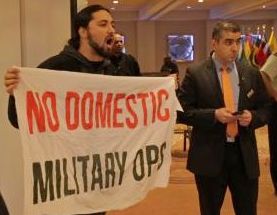 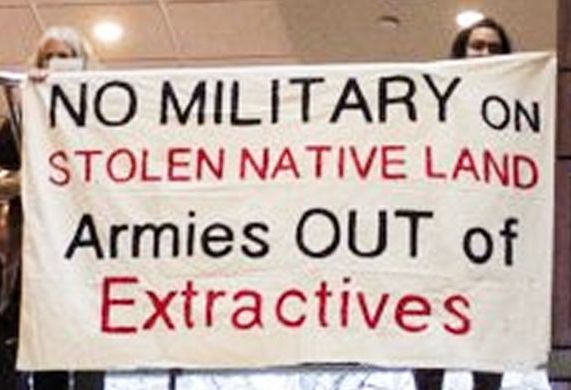
Action February 9, 2017 at the Conference of American Armies conference
in Toronto.
The Communist Party of Canada (Marxist-Leninist)
condemns
the holding of a Conference of American Armies (CAA) Specialized
Conference on "domestic operations" in Toronto from February 6 to
10. According to Canada's Department of National Defence, the
theme of the meeting was, "Training in the Interagency
Environment" and focused on "training for domestic operations
with an emphasis on sharing lessons learned and best practices."
An army press release informs that among the case studies
discussed was the experience of the G20 Summit in Toronto in
2010.
Founded in 1960, one year after the triumph of the
Cuban
Revolution, the CAA served as a coordinating body for the
genocidal repression by U.S. imperialism of the workers, peasants
and Indigenous peoples of Latin America and the Caribbean in the
name of "containment of communism" during the Cold War. Its
policy, laid out at its 1973 meeting just days before the
September 11 coup d'état in Chile, is that the military forces
of
member countries bear ultimate responsibility for defeating
communism and subversion.
The renewed focus of the CAA on "domestic operations"
at this
year's meeting is a hostile undertaking to defend the hegemony
of U.S. imperialism throughout North, South and Central America
and the Caribbean, to coordinate the use of force against the
resistance movements of the peoples of the Americas and intensify
the policy of state attacks, assassination and subversion against
land defenders and Indigenous peoples affirming their
sovereignty. It comes in the context of the ongoing brutal
repression of people fighting for their rights by the military of
Honduras, the increasing use of force against those at Standing
Rock, North Dakota protesting the Dakota Access Pipeline, the
threats of Canada's Minister of Natural Resources to use military
force against those protesting pipeline development projects and
resistance to the neo-liberal takeovers in Brazil and
Argentina. The meeting is a stark reminder of the need for the
peoples of the Americas who have made headway in affirming their
rights and sovereignty to ensure the armed forces of their
countries never again come under U.S. command. It further stands
in violation of the proclamation of Latin America and the
Caribbean as a Zone of Peace adopted at the second Community of
Latin American and Caribbean States (CELAC) Summit in Havana,
Cuba in 2014. It must not pass!
CPC(M-L) congratulates those who took the initiative to
oppose the CAA meeting in Toronto. On February 9, protestors
interrupted the proceedings to denounce the CAA and to point out
that many of its member militaries, including Canada's, are
involved in the repression of Indigenous peoples and other
collectives of people fighting for their rights.
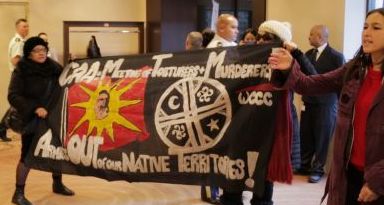
Jayden Lavallee, a Métis organizer who took part
in a
February 9 demonstration at the Sheraton Hotel where the CAA met,
said to the Media Co-Op, "The state, and the military backing it,
come down with brutal force on Indigenous peoples asserting their
responsibilities to protect the water, as has been so illustrated
in the camps of Standing Rock with the involvement of the
National Guard. This conference on 'domestic operations' is about
armies of colonial states mobilizing to better defend industry
from Indigenous people and their allies."
Others noted that among those taking part in the
meeting was
Honduran Col. Gabriel Rixci Cárcamo Bonilla, responsible for the
Honduran Third Infantry Battalion in the northern town of Naco
from 2013 to 2014. During that time, the Honduran Military Police
of Public Order (PMOP) and Intelligence Troop and Special
Security Response Groups (TIGRES) both of which are used to
repress the political movements of Hondurans, were trained at the
base Bonilla commanded. Karen Spring, Coordinator of the Honduras
Solidarity Network, criticized the Canadian government for its
"support of the Honduran regime despite in-depth reports and
documentation of extremely high levels of human rights
violations, impunity and corruption."
In the situation of the anarchy and violence unleashed
by
U.S. imperialism, now taken to further extremes under the Trump
administration, and the counter-attacks of the forces of
imperialism against the political movements of the people across
the Americas and Caribbean, Canadians do not agree with hosting
such meetings. Neither do they agree with reviving Cold War
instruments against communism and national liberation as
mechanisms to coordinate attacks on the people's resistance
today. More than ever, Canadians must deliberate themselves on
questions of war and peace and take practical steps to ensure
Canada is a force for peace and such activities are not
permitted.
Condemn the Conference of American
Armies!
All Out to
Establish an Anti-War Government to Make Canada a Zone for Peace!

An Unacceptable Enterprise
- Charlie Vita -
The Conference of American Armies (CAA) was founded in
1960. That year, Major Theodore F. Bogart, head of U.S. Southern
Command, invited the military heads of Latin American and
Carribean countries in the sphere of U.S. imperialism to meet at
a U.S. base in the Panama Canal Zone. The meeting established the
CAA as an anti-communist instrument of U.S. imperialism under the
name Army Commanders International Organization in the Western
Hemisphere. Its first meeting was held under the theme, "The
Security of South America," targeting the "common enemy" of
communism and the workers' and national liberation movements of
the peoples of the Americas. Its stated aim is to "heighten
cooperation and integration between the Armies and to contribute
from a military thinkers' point of view to the security and
democratic development of member countries." From 1960 to 1963
meetings were held at U.S. Fort Amador in Panama and in 1964
moved to the U.S. Military Academy at West Point.
|
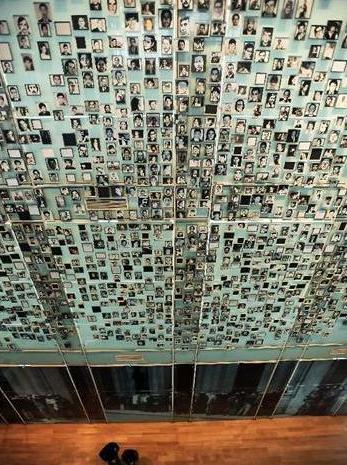
Museum in Chile commemorated those killed
in U.S. backed dirty wars.
|
The CAA, along with the U.S. School of the Americas,
was a
main coordinating body for the brutal U.S.-backed dirty wars and
state terror against the peoples of Latin America and the
Carribean known as Operation Condor. At its second
meeting, in 1961, the CAA established a standing committee in the
Panama Canal Zone for the exchange of information and
intelligence. A network of military attachés called Agremil was
established to share common information on "subversives" among
intelligence agencies, militaries and death squads. During the
meeting of the CAA in Caracas, Venezuela on September 3, 1973 --
eight days before the coup d'état in Chile -- the head of the
Brazilian army General Breno Borges Fortes proposed that the
struggle against communism must be led by the armed forces of
each country, and that "the only effective methods are the
exchange of experience and information, plus technical assistance
when requested." The CAA decided to "strengthen information
exchange in order to counter terrorism and control subversive
elements in each country."
At its October 19-26, 1975 meeting in Montevideo,
Uruguay,
the CAA established a "working meeting on national intelligence
services" prepared by Chilean dictator Pinochet's point man
against communism Col. Manuel Contreras. That meeting, which took
place November 25-December 1, 1975 in Santiago de Chile,
created a continental database "similar to the Interpol database
in Paris, but specialising in subversion." Operation Condor
meetings then continued, parallel to CAA
meetings, with many of the same figures attending both.
CAA meetings continued to take place under U.S.
guidance as
brutal massacres and other crimes in Latin America and the
Carribean were met by resistance and wars of national liberation.
In 1977 the CAA met in Managua, Nicaragua (a year before the
overthrow of the Somoza regime by the Sandinista National
Liberation Front), and in 1979 in Bogota, Colombia. The people's
victory in Nicaragua encouraged CAA members to standardize and
align methods to accelerate the fight against "subversion" and
the dirty wars and repression against the peoples of Central and
South America intensified. The CAA met in Washington, DC in 1981
shortly after the election of Ronald Reagan as U.S. President.
The meeting agreed to renew bilateral information-sharing
agreements on "subversives" and create a permanent CAA
Secretariat. The Secretariat was established in Santiago de Chile
on May 24, 1984. The CAA increasingly came to view all those
considered left-wing or subscribing to liberation theology as
part of its war against communism.
The Conference of American Armies Permanent Executive
Secretariat (PESCAA) for 2016-2017 is based in the United States.
Its responsibilities include "Conduct the planning, managing,
executing,
controlling and evaluating the process that unfolds during the
organization's cycle, guided by its aim and whatever accords are
adopted by the Commanders for the corresponding cycle."
Its president is U.S. General Mark A. Milley,
commanding
general of U.S. Army Forces Command, consisting of 750,000 active
Army, Reserve and National Guard soldiers. The CAA
Secretary-General is U.S. Major General Clarence K.K. Chinn, the
Commanding General of U.S. Army South located at Fort Sam
Houston, Texas. The U.S. Army South is the army component of
USSOUTHCOM, whose stated "area of responsibility" includes the
entirety of Central and South America and the Caribbean and its
32 sovereign states. Its Permanent Executive Secretary is Colonel
Brian McNaughton.
The current CAA member armies are Antigua &
Barbuda,
Argentina, Bolivia, Brazil, Canada, Chile, Colombia, Dominican
Republic, Ecuador, El Salvador, Guatemala, Honduras, Mexico,
Nicaragua, Paraguay, Peru, Trinidad & Tobago, United States,
Uruguay and Venezuela. The five observer armies are Barbados,
Belize, Guyana, Jamaica and Suriname, while the Special Observer
Army is Spain. Two international military organizations also
enjoy observer status: the Central American Armed Forces
Conference and the Inter-American Defense Board.
Canada's Participation
Canada joined the CAA in 1993. Prior to the latest
meeting in Toronto, it has hosted six CAA meetings since joining,
the most recent in September 2003 in Ottawa. Since that time, a
ministerial order has been adopted entitled "Conference of American
Armies Privileges and Immunities Order," granting CAA
representatives diplomatic immunity for the duration of the
conference. Canada's armed forces identifies its "priority
partners" for bilateral military cooperation as Mexico, Brazil,
Chile, Colombia and Jamaica. A Canadian army press release states
that Secretary General of the CAA U.S. Major General Clarence
K.K. Chinn, Commander of U.S. Army South, welcomes the
"opportunity to discuss operations in the interagency
environment, saying, 'The reality of the current global state of
affairs is increased instability, which now more than ever
underpins the importance for our armies to continue to dialogue
and work together to protect our interests.'"
The CAA meeting in Toronto from February 6 to 10 had an
"overarching theme" of "how armies can work with different levels
of organizations in the face of growing challenges to regional
defense, while considering the different capabilities, roles and
legal frameworks of each country," Natalie Flynn of Canadian Army
Public Affairs wrote. "In line with the theme, the Canadian
Army's designated topic for the CAA's Specialized Conference
focused on the training aspect of interagency operations, which
includes large-scale planned activities, such as major athletic
events and summits, and unexpected incidents, such as natural
disasters. [...]
"According to Lieutenant General Wynnyk, this is an
area for
which the Canadian Army is well-positioned to provide expertise,
given its experiences with major domestic security operations and
responses to natural disasters, both domestic and international.
Case studies discussed during the Specialized Conference included
security for the Vancouver Olympic Games and the G20 summit in
Toronto, as well as preparing for a major earthquake on the west
coast of Canada."
At the 2010 G20 Summit in Toronto, the Canadian
military (represented by Canada Command) was part of the Integrated
Security Unit which brought under military command all levels of
police, intelligence and even private security agencies. It worked
directly with the North American Aerospace Defense Command (NORAD),
which comes under the control over U.S. Northern Command. These bodies
were responsible for violations of the people's rights that included
pre-emptive arrest, mass criminalization of dissent, violence and
incarceration. Canadians have not forgotten that the G20 summit was
precisely used as a training ground for "interagency" operations all
under NORAD command. Seven years and several investigations later,
including by the Ontario Ombudsman, the Commission for Public
Complaints Against the RCMP and the Public Interest Investigation into
RCMP Member Conduct Related to the 2010 G8 and G20 Summits, the
experience is now presented as a "case study" of "best practices" for
repressing the people's movements.

Discussion
Significance of Talk of Balanced and Fair Trade Between
Canada and U.S.
- K.C. Adams -
A theme emerging since the election of Donald Trump is
that Canada will be favoured by the Trump presidency as compared to
countries such as Mexico and China. While Mexico and China are
presented as being targeted by Trump, trade between Canada and
the U.S. is said to be balanced, which is presented as being
synonymous with being fair trade or even mutually beneficial
trade.
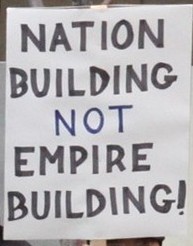 Trump upon removing
the U.S. from the Trans Pacific Partnership (TPP) on January
23, said he would pursue fair trade deals. In some cases this
move is being cheered by representatives of unions and talked
about as something that is good for workers. Trump upon removing
the U.S. from the Trans Pacific Partnership (TPP) on January
23, said he would pursue fair trade deals. In some cases this
move is being cheered by representatives of unions and talked
about as something that is good for workers.
NAFTA is also targeted by Trump. Canadian working
people are
told that while trade between the U.S. and Canada is balanced,
trade between the U.S. and Mexico is not. Canada is presented as
being in a privileged position and the issue is to keep our heads
low. This argument says that trade between Canada and the U.S. is
relatively close or balanced as compared to trade between the
U.S. and Mexico and the U.S. and China. In some cases it is said
that Trump's agenda overall could even benefit Canada, as a
perceived trade deficit between Canada and Mexico could be
addressed.
Describing the issue of trade debts and deficits
Michael Den
Tandt wrote on January 23 in the National Post:
"Mexico, according to the Office of the United States
Trade
Representative, had two-way goods trade with the United States
worth U.S.$531-billion in 2015. The U.S. deficit in that exchange
was $58-billion, meaning Americans bought $58 billion more in
goods from Mexicans, than they sold to them."
"China had two-way goods trade with the United States
of
$659.4-billion in 2015. American exports to China amounted to
just $116-billion, whereas U.S. goods imports from China were
worth $482-billion. The U.S. deficit in that exchange was a
whopping $366-billion. It's a huge imbalance.[1]
"[Canada] had two-way goods trade with the United
States
worth $575-billion in 2015, but in almost even measure -- a
deficit for America of just $15 billion. Goods bought (by the
U.S.) from Canada are led by mineral fuels, oil and natural gas,
to the tune of $70 billion in 2015. The top three categories of
American goods bought by Canadians, meantime, were vehicles ($48
billion), machinery ($43 billion) and electrical equipment ($25
billion.)"
Jim Stanford, former Unifor economist and current
economics
professor at McMaster University reiterated this theme in a
January 5 article in The Globe and Mail (TML
emphasis):
"U.S. auto trade with Canada is balanced,
unlike
Mexico. Two-way auto trade between Canada and the U.S. is huge:
around $135-billion last year. We sell more vehicles to the U.S.
than we import from them, but we buy a lot more parts from the
U.S. The resulting imbalance (in Canada's favour) is small,
relative to a very large two-way flow. If we include Canadian
purchases of auto-related services (such as engineering,
marketing, and management payments to U.S. parent firms), and
repatriation of profits on Canadian operations, it's a wash. This
is one case where trade is actually balanced and
mutually
beneficial (like the economics textbooks say it should be). This
is thanks to the Canada-U.S. Auto Pact, implemented in 1965,
which required auto trade to go both ways.
"With Mexico, on the other hand, auto trade (under
NAFTA's laissez faire
rules) is precariously unbalanced. The U.S. imports
more than 10 times as many vehicles from Mexico (2.3 million
units in 2015) as it sells there.
"And thanks to our large parts purchases from the U.S.,
each
Canadian-made vehicle contains 50 per cent more U.S.-made
components than do Mexican-made vehicles. Any disruption in
cross-border auto trade with Canada would hurt the U.S. as much
as us."
Readers should note the use in both articles of broad
one-nation terms such as "U.S.," "Mexico" and "us Canadians" or
"we" or "our" without any reference to the concrete social
classes and conditions of the peoples involved according to the
relations of production and their social class position of
wealth, power, and privilege or absence thereof. Relations of
production in the modern world exist mainly between those who
sell their capacity to work and those who buy workers' capacity
to work. Those who buy workers' capacity to work in the basic
sectors are mostly concentrated in oligopolies controlled by
billionaire oligarchs.
When discussing trade (or any social, political or
economic
matter) an analysis must discuss in concrete terms who controls
and who benefits from the trade and the social classes involved
and how they relate to one another and the productive forces.
Otherwise, the discussion descends into obscurantism and
anti-worker chauvinism and support for the oligopolies and their
plans for dealing with their problems on the backs of the working
class.
Broad terms without social class content or historical
context can be manipulated to prove a preconceived notion. These
terms and the presumptive conclusions derived from them take
readers away from concrete analysis of concrete conditions and
from making warranted conclusions.
 The global oligopolies
control auto production in all three
North American countries. The recent GM announcement moving auto
production from Ingersoll, Ontario eliminating over 600 auto jobs
reflects this control without concern for the working class,
community or economy wherever they operate. The oligopolies
control trade to the point that much of the trade exists
internally within a particular ownership group. The working class
does not control the auto sector or any other sector. The
oligarchs own and control all basic sectors and control the
trade. They seize the objective value workers create in all three
countries and dictate where that value ends up and how it may be
employed. Much of the value in the auto sector has been
marshalled into robotics to decrease the amount of work-time
necessary to produce vehicles. This has put enormous downward
pressure on the working class of all three countries. The global oligopolies
control auto production in all three
North American countries. The recent GM announcement moving auto
production from Ingersoll, Ontario eliminating over 600 auto jobs
reflects this control without concern for the working class,
community or economy wherever they operate. The oligopolies
control trade to the point that much of the trade exists
internally within a particular ownership group. The working class
does not control the auto sector or any other sector. The
oligarchs own and control all basic sectors and control the
trade. They seize the objective value workers create in all three
countries and dictate where that value ends up and how it may be
employed. Much of the value in the auto sector has been
marshalled into robotics to decrease the amount of work-time
necessary to produce vehicles. This has put enormous downward
pressure on the working class of all three countries.
Throwing around broad terms without social class
content and
historical context blocks auto workers and other working people
from discussing, investigating, organizing and fighting for a new
human-centred direction for the economy where the actual
producers of social product and its objective value control
production and importantly control how the value they create is
distributed and employed.
Stephen Schwarzman is billionaire chief executive of
the U.S.
investment firm Blackstone Group and head of Trump's Strategic
and Policy Forum. After Schwarzman's meeting with Prime Minister
Trudeau and his cabinet on January 23, he presented his view to
reporters saying: "I think trade between the U.S. and Canada is
very much in balance and is a model for the way trade relations
should be."
"Because Canada's held in very high regard. We have
balanced
trade between the U.S. and Canada. That's not the kind of
situation where you should be worried."
The meeting and Schwarzman's comments seem to have
turned the
elected officials of the Trudeau government into grovelling
beggars heaping praise on Trump and his team of plutocrats. In
response to Schwarzman's remarks, Innovation, Science and
Economic Development Minister Navdeep Bains said: "We're very
fortunate to be in that position. We don't take it for granted,
and we'll continue to make sure we talk about the integrated
nature of our economies."
Trudeau's Trade Minister Francois-Philippe Champagne
praised
Schwarzman for his "very deep understanding of the relationship
between the United States and Canada."
Transport Minister and chair of the Cabinet Committee
on U.S.
Relations Marc Garneau told CTV: "(Schwarzman) gave us his view
on the lay of the land, and it was a very encouraging one . I
think that the relationship between the new Trump administration
and Canada is going to be a very good one."
The issue presented to the working class and other
Canadians
to take up is to hope that Trump's team of plutocrats will buy
the arguments made by the Trudeau government and various
spokespersons of the oligopolies that trade is balanced and even
mutually beneficial. With the oligarchs' acceptance of the
argument, all will be A-Ok.
If not, then Canadians will be asked to rally behind
the
Trudeau government in trying to convince the U.S. Congress of the
correctness of Canada's position and cause. Especially important,
Canadians are told, is to convince those powers-that-be from 35
particular states that they benefit directly from Canadian trade
and they should work on Trump and tell him to be good to us
because after all those states are said to rely on Canada as
their number one partner both for buying and selling goods.
In all cases, the Canadian working people are supposed
to
appeal to Trump in the hopes he uses the state police powers in a
manner that targets Mexico and not Canada. If appeals to Trump
fail to convince him of how great a neighbour Canada is, then we
should appeal to the U.S. Congress to challenge Trump over whom
he targets with those executive orders and police powers.
Chatter About Integration
The Canadian government, various university academics
and
spokespersons for the monopolies argue that besides this
"balanced and mutually beneficially trade" with the U.S., the
economies of both countries are so integrated that any tax on
imports and exports of Canadian goods would harm the oligopolies.
The seizure of a border tax would result in a deduction from
profit unless the amount could be passed on in the market
price.
Brendan Sweeney, professor at McMaster University in
the
Automotive Policy Research Centre writes in Open Canada of
the just-in-time integrated production techniques of the auto
oligopolies: "Over the last half-century, the production and
marketing of vehicles became highly integrated between the U.S.,
Canada and Mexico. Today, under NAFTA, automotive supply chains
crisscross the continent. Vehicles assembled in any one partner
country contain parts produced in all three. Integration permits
specialization, efficiencies and productivity gains. (In his
enthusiasm, the professor fails to mention the downward pressure
on workers' wages and working conditions arising from automation
under the control of the financial oligarchy.)
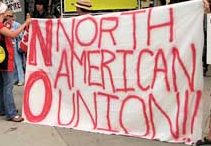 "Vehicle sales in the U.S.
and Canada are at record levels,
and several models preferred by U.S. customers are produced
exclusively in Canada, including the Ford Edge, Chrysler
Pacifica, Chevrolet Equinox and Toyota RAV4. Increasing the price
of these vehicles to American consumers by taxing vehicles
imported from Canada would likely be unpopular." "Vehicle sales in the U.S.
and Canada are at record levels,
and several models preferred by U.S. customers are produced
exclusively in Canada, including the Ford Edge, Chrysler
Pacifica, Chevrolet Equinox and Toyota RAV4. Increasing the price
of these vehicles to American consumers by taxing vehicles
imported from Canada would likely be unpopular."
Chrystia Freeland, as Minister of International Trade,
went
so far as to say, "Canada was part of the U.S. supply chain"
implying clearly that to her Canada is not a sovereign nation but
an appendage of the U.S. because the oligopolies operate without
borders or any concern for sovereignty.
The oligopolies have established operations in North
America
that do not recognize the existence of distinct nations and
peoples. They speak only of "jurisdictions," which are pitted
against one another and manipulated to pay tens and hundreds of
millions of dollars in extortion money for the privilege of
having operations established in a particular location only to be
moved or cratered if those operations no longer fit into their
self-serving schemes such as the current GM plan to eliminate 600
jobs in Ingersoll.
This so-called integration of production and sales is
presented as something the working people should defend and
uphold to preserve their jobs and very existence as a country. In
other words the negation of sovereignty and a self-reliant
pro-social economy that favours the people is presented as the
pre-condition for any discussion about trade, whether free trade
favoured by the Trudeau/Freeland/Clinton gang or the
protectionist trade of the Trump gang. This itself shows that the
discussion is not actually about trade with the U.S. but about
how Canada should subordinate itself to U.S. imperialism and the
narrow interests of the financial oligarchy.
Concern Over Side-Effects
What are the reasons behind oligarch Trump's open
hostility
towards Mexico and Mexicans, which could cause problems for
certain oligopolies? Relations are deteriorating rapidly with
Trump's national and racist insult of building a border wall with
Mexico and taxing Mexican imports to pay for it. A section of the
oligarchs may see a war with Mexico as an option to complete the
U.S. annexation of Mexican territory and people begun in the
Mexican-American War of 1846-48 when the U.S. seized vast swaths
of Mexican territory including California, Texas, New Mexico,
Arizona and other areas. Some consider a new war with Mexico as a
way to quell the gathering storm of civil war within the United
States.
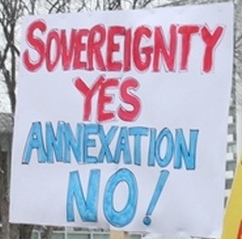 In the case of Mexico in
particular, the integration of the
operations of many oligopolies operating throughout North America
means that any tariff or tax on Mexican goods, such as Trump's
proposed 20 per cent tariff on all Mexican exports to the U.S.,
could put downward pressure on the rate of profit. In this sense,
under the Trump regime, integration of the Canadian economy with
Mexico is presented as a liability while deeper annexation into
the U.S. Empire is considered an asset. In the case of Mexico in
particular, the integration of the
operations of many oligopolies operating throughout North America
means that any tariff or tax on Mexican goods, such as Trump's
proposed 20 per cent tariff on all Mexican exports to the U.S.,
could put downward pressure on the rate of profit. In this sense,
under the Trump regime, integration of the Canadian economy with
Mexico is presented as a liability while deeper annexation into
the U.S. Empire is considered an asset.
Side-effects from Trump's dustup with Mexico may lead
to
problems that could be avoided according to certain members of
the Canadian political elite who propose deeper integration and
even complete annexation into the U.S. Empire while distancing
Canada from Mexico for the time being.
A report by Robert Fife in The Globe and Mail
states:
"A senior Canadian government official told The Globe and
Mail the signals from Mr. Trump's trade team indicate the
trade focus will largely be aimed at Mexico, essentially cutting
the United States' southern neighbour out of many NAFTA
benefits.
"'The clear indication we have gotten from that side of
the
operation is that they are targeting Mexico and not us,' the
official said. 'We are keeping an open line of communication with
them so we know what things they are planning to do with Mexico
and that have a major knock-on effect with us'."
Quandary Over Trade and the Keystone XL
Another issue has emerged based on the argument over
trade
debts and deficits. It lies with Trump's January 23 approval of
the Keystone pipeline, as well as with reported demands by
Trump's commerce secretary Wilbur Ross that trade deals should be
regularly reopened to ensure trade remains fair, at least from
the point of view of the U.S. imperialists.
This means the U.S. elite, and Trump's gang in
particular
with its mania for the "art of the deal," want to automatically
open, or regularly negotiate changes to free trade agreements
such as NAFTA. Deals would be renegotiated in response to changes
in the price of oil or other commodities for example, which could
radically change the balance of trade in money and cause debts
and deficits to the United States. In effect, the dominant
oligopolies would constantly be demanding changes to the terms of
trade to suit their private interests.
 Following Trump's approval
of the Keystone XL, and his demand
for a new deal, certain commentators say that the additional oil
flowing south from Canada could unbalance Canada/U.S. trade
leading to a U.S. trade deficit with Canada. The solution
presented is deeper annexation, which would mean that U.S.
imports of Canadian oil would not be considered imports at all;
Canadian oil reserves would be considered part of the U.S.
domestic supply. The solution would be to concede Canadian
sovereignty and control over its territory and resources in the
name of preserving Canada's export of resources to the U.S. This
argument, which for many Canadians is irrational and
capitulationist and a complete abandonment of any independence
and control over the Canadian economy, would extend to all
Canadian resources such as Canada's forests and water. The
proposal is officially and legally to turn Canada into a vast
storehouse of resources for the U.S.-headquartered oligopolies
and their drive for world hegemony. Following Trump's approval
of the Keystone XL, and his demand
for a new deal, certain commentators say that the additional oil
flowing south from Canada could unbalance Canada/U.S. trade
leading to a U.S. trade deficit with Canada. The solution
presented is deeper annexation, which would mean that U.S.
imports of Canadian oil would not be considered imports at all;
Canadian oil reserves would be considered part of the U.S.
domestic supply. The solution would be to concede Canadian
sovereignty and control over its territory and resources in the
name of preserving Canada's export of resources to the U.S. This
argument, which for many Canadians is irrational and
capitulationist and a complete abandonment of any independence
and control over the Canadian economy, would extend to all
Canadian resources such as Canada's forests and water. The
proposal is officially and legally to turn Canada into a vast
storehouse of resources for the U.S.-headquartered oligopolies
and their drive for world hegemony.
On January 23, Campbell Clark wrote in The Globe
and
Mail :
"Approval of Keystone XL could clash with another major
aspect of Mr. Trump's trade policy: undoing U.S. trade
deficits.
"The U.S. enjoyed an $11.9-billion (U.S.) trade surplus
with
Canada in 2015. But Keystone XL would wipe out the U.S. trade
surplus, and a hike in the price of oil to $75 or $80 a barrel
would suddenly turn it to deficit.
"Imagine what that could mean for Canada under a new,
rewritten NAFTA that triggers a renegotiation whenever the U.S.
develops a trade deficit with Canada: when oil prices go up,
trade rules for other goods from cars to cattle could be
rewritten, creating uncertainty for exporters.
"If Mr. Trump gets the pipeline he wants, Canada could
expect
NAFTA to be re-opened again. And again.
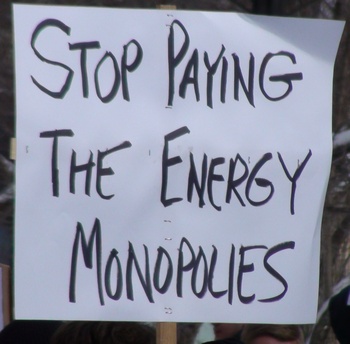 "[I]t could be critical for
Mr. Trudeau to convince Mr. Trump
that he should consider Canadian oil like U.S. oil -- in other
words, that the U.S. should not count Canadian oil as an import
when they consider their trade balance. "[I]t could be critical for
Mr. Trudeau to convince Mr. Trump
that he should consider Canadian oil like U.S. oil -- in other
words, that the U.S. should not count Canadian oil as an import
when they consider their trade balance.
"Mr. Trudeau must work to make the Trump Administration
see
Canadian oil as part of their own continental supply --
otherwise, in Washington's eyes, a pipeline or a price change
could tilt the balance."
In addition to these arguments that are tantamount to
U.S.
annexation of Canada and liquidation of any notion of an
independent Canada, others are being presented to position Canada
to have more trade with China as a back-up if things do not go
well with the United States. In this regard, following Trump's
abandonment of the TPP, Canada begins exploratory talks on a free
trade deal with China starting this month. Another proposal being
bandied about is to have Canada work closely with Mexico and
Latin America to deal jointly with Trump.
In all these cases, the issue presented is that the
crisis of
uncertainty Trump has created should not be resolved in favour of
a new direction for the economy, including international trade
that favours the working people. Instead, the proposals and calls
to deal with the crisis direct the country towards preserving the
domination and control of the financial oligarchy in one way or
another. None of the proposals looks to a new direction for the
economy and trade based on having an independent diverse
self-reliant economy under the control of the actual producers. A
human-centred economy in Canada would rely on its own internal
strength and extended reproduction to guarantee the rights and
well-being of all, and would trade with others for mutual benefit
of the peoples involved and the collective peaceful development
of all humanity.
Note
1. The capital-centred economic terms
in the National Post item carry loaded meanings that can
easily be manipulated to promote a thesis. The market prices for
Chinese exports are not comparable with the objective value of
similar goods produced in the United States or Canada. The U.S.
and Canadian importers of Chinese goods are buying them at market
prices far below any comparable prices of production for similar
goods produced in the United States and Canada. It could be said
that the developing countries are subsidizing the imperialist
heartlands.
Many of the Chinese goods exported to the U.S. and
elsewhere
are produced on orders from huge U.S. (or European or Japanese)
retailers such as Wal-Mart or on consignment such as Apple
iPhones for sale throughout the world. This results in a transfer
of objective value from the Chinese working people to the
oligarchs in the U.S. This, coupled with U.S. dollar hegemony as
the official and dominant reserve and trading currency within the
imperialist system of states, forces developing countries such as
China and others to buy U.S.-issued dollar denominated treasury
bonds merely to facilitate international trade and commerce, and
also as a hedge against attacks on their own currencies. The U.S.
trade deficits are mostly illusory as they are partly financed
with U.S. treasury bonds and a U.S. national debt that is
constantly turned over with new debt until an intractable crisis
erupts and a global rebellion against U.S. hegemony sweeps the
world.
These are major factors currently transferring value
into the
coffers of the U.S. financial oligarchy allowing U.S. imperialism
amongst other things to finance its massive military and
political machine around the world with bases and operations
everywhere engaged in continuous predatory wars and interference
in sovereign countries up to and including regime change and
military occupation.

Fifth Summit of Community of Latin
American and
Caribbean States
Meeting Reaffirms Latin America and the
Caribbean as a Zone
of Peace

The Fifth Summit of the Community of Latin American and
Caribbean States (CELAC) was held at Punta Cana in the Dominican
Republic on January 24-25. CELAC's members include every country
in the Americas with the exception of Canada, the United States,
and colonial holdings of European countries and the U.S.
Altogether, the organization encompasses 33 countries
representing over 600 million people.
The Summit opened on January 24 with a minute of
silence in
homage to the historic leader of the Cuban Revolution, Fidel
Castro. In opening the first session, Dominican President Danilo
Medina, whose country held CELAC's presidency for 2016, paid
tribute to Fidel as "one of the main promoters of the Community
and a firm believer throughout his life in the dream of a region
united in the path of progress." In reference to CELAC, he said
it was "in this alliance of peoples, in this community of
brothers, where we must find the ideas, paths, actions and
political will to realize the historical destiny of Latin America
and the Caribbean."
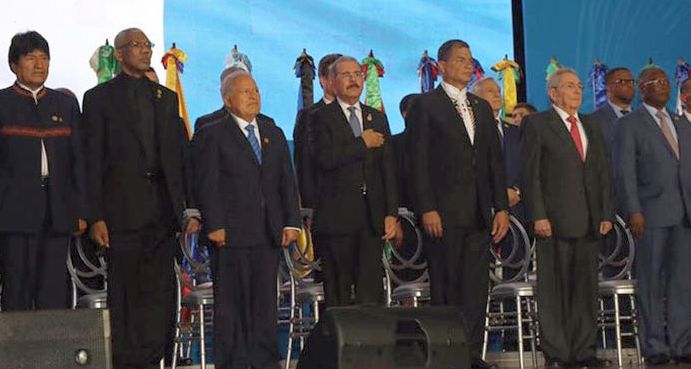
CELAC conference opens with minute of silence in honour of Fidel.
Reports indicate that representatives of 29 member
countries
intervened in the plenary session. A number of member countries
did not send heads of state, including Brazil and Argentina,
while the presidents of Chile, Colombia and Mexico had confirmed
attendance but cancelled at the last minute citing pressing
domestic issues. At the end of the Summit, President Salvador
Sánchez Cerén assumed the Pro-Tempore Presidency of CELAC
for
2017 on behalf of El Salvador, saying it represented a great
recognition but also an enormous responsibility for his
country.[1]
The Summit concluded with the issuing of the Political
Declaration of Punta Cana along with 20 Special Declarations and
the 2017 CELAC Plan of Action. Foreign ministers as well as
representatives from other government ministries will meet
throughout the year to discuss areas of cooperation on issues
identified in the Plan of Action.
Declaration of Punta Cana
The Declaration states that "dialogue and political
agreement
on the basis of mutual trust between our governments and respect
for differences are essential for further progress towards the
political, economic, social and cultural integration of the
Community." It also reaffirms member countries' "commitment to
the consolidation of Latin America and the Caribbean as a Zone of
Peace, proclaimed at the II Summit, held in Havana in January
2014, as a benchmark for inter-State relations and contributing
to the climate of respect, mutual trust and confidence-building
among member countries."
In their relations within the region, member countries
are
called upon to respect the principles of the Declaration "aimed
at the settlement of disputes by peaceful means and the
recognition of the right of States to have their own political
system and economic, social and cultural development as an
indispensable basis for promoting peace and harmony in the
region."
The Declaration also expresses CELAC's support for the
process of national dialogue in the Bolivarian Republic of
Venezuela between the Government and the opposition "within the
framework of the constitution and laws of Venezuela and under the
principle of respect for non-interference in the internal affairs
of States."
With respect to international peace and security it
reaffirms
member countries' support for the peaceful use of Information and
Communication Technologies (ICT) and urges "the international
community to avoid and refrain from unilateral acts that are not
compatible with the purposes and principles of the Charter of the
United Nations, the Universal Declaration of Human Rights and
International Law, such as those which aim to subvert societies
or create situations with the potential to foment conflicts
between States."
It rejects the application of unilateral coercive
measures,
including lists and certifications applied to countries of Latin
America and the Caribbean in violation of international law.
The Declaration reiterates CELAC's concern over the
adoption
of the Executive Decree of the United States, originally approved
on March 9, 2015 and renewed for the second time in January as
one of the last acts of outgoing President Barack Obama, that
designates Venezuela as an "unusual and extraordinary threat" to
U.S. national security and applies unilateral sanctions against
government officials of the Bolivarian Republic of Venezuela.
The Declaration calls on the United States to
unconditionally
end the economic, commercial and financial blockade against Cuba
and to return the territory occupied by its naval base at
Guantánamo to Cuba. At the same time it welcomes the progress in
relations between the governments of Cuba and the United States,
including the immigration agreement reached on January 12, which
ended the so-called wet foot-dry foot policy which granted
automatic residency to Cubans who set foot on U.S. soil, and the
Parole Program which encouraged Cuban doctors to abandon their
overseas missions.
On the issue of decolonization the Declaration
reiterates the
Latin American and Caribbean character of Puerto Rico and, taking
note of the decisions adopted by the Special Committee on
Decolonization of the United Nations, reaffirms that this is a
matter of interest to CELAC.
Other issues addressed and which form part of CELAC's
work
agenda for 2017 include food security, development, gender
equality, migration, disaster risk management, climate change and
environmental protection, biodiversity, the struggle against
corruption, the global drug problem, culture, international
cooperation, trade, human and transnational rights and reform of
the United Nations.
Note
1. Each year, the country
holding
the CELAC presidency for that year hosts a Summit of Heads of
State and Government which convenes leaders to set the
organization's agenda and objectives for the next year. The first
Summit was in Chile in 2013, followed by Cuba (2014), Costa Rica
(2015) and Ecuador (2016).

Gathering of Social Movements and Political Forces
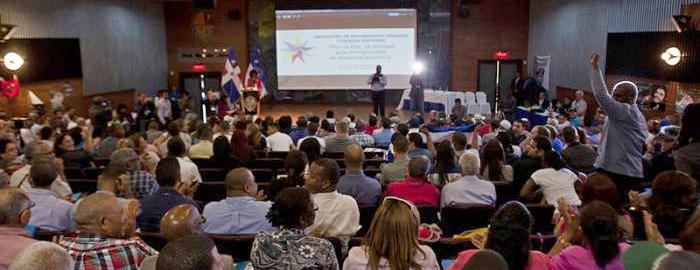
More than 400 delegates from 15 countries participated
in
a Meeting of Social Movements and Political Forces at the
Autonomous University of Santo Domingo in the Dominican Republic
January 23 - 24, parallel to the Community of Latin American and
Caribbean States (CELAC) Summit. Organizers said participants
expressed firm support for the work being done by CELAC to
promote integration and called for greater participation of the
peoples of Latin America and the Caribbean in these efforts.
The gathering concluded its deliberations with the
issuing of
The Declaration of Santo Domingo expressing its "support for the
Fifth Summit of Heads of State and Government of the [CELAC
States], together with the hope that it will further contribute
to the consolidation and strengthening of this important
mechanism for concentration of joint action by our countries, in
defence of the interests and rights of nations and peoples."
Through the Declaration, those gathered expressed their
support for the struggles of the peoples of Latin America and the
Caribbean for peaceful relations and in defence of their
sovereignty, independence and right to self-determination. For
the full Declaration click
here.

Never Has It Been More Necessary to Effectively Advance
Along
the Path of Unity
- Raúl Castro -
Speech by Army General Raúl Castro Ruz,
President of
the Councils of State and Ministers of the Republic of Cuba, at
the 5th Summit of the Community of Latin American and Caribbean
States (CELAC) in Punta Cana, the Dominican Republic, on January
25, 2017.
***

Esteemed President Medina;
Esteemed Heads of State and Government of Latin America
and
the Caribbean;
Distinguished Heads of Delegations and guests:
At the Summit that gave life to this Community, in
Caracas in
2011, we expressed the conviction that "unity and the political,
economic, social and cultural integration of Latin America and
the Caribbean constitute [...] a requirement for the region to
successfully confront the challenges before us."
Never has it been more necessary to effectively advance
along
the path of unity, recognizing that we have many common
interests. Working for "unity within diversity" is an urgent
need.
To achieve this, strict adherence to the Proclamation
of
Latin America and the Caribbean as a Zone of Peace, signed by
Heads of State and Government in Havana in January 2014, is
required, in which we commit ourselves "to strict compliance with
their obligation not to intervene, directly or indirectly, in the
internal affairs of any other State," and to resolve differences
in a peaceful manner, as well as to "fully respect the
inalienable right of every State to choose its political,
economic, social and cultural system."
It is therefore essential that all members of the
international community fully respect the principles of the
Proclamation in their relations with CELAC countries.
It would be desirable for the new United States
government to
opt for respect for the region, although it is a matter of
concern that intentions have been declared that endanger our
interests in the areas of trade, employment, migration and the
environment, among others.
It is therefore imperative to establish common courses
of
action and to make the organization of CELAC more effective.
Furthermore, a return of neoliberalism would increase
poverty
and unemployment, thus aggravating social conditions in Latin
America and the Caribbean.
Mr. President:
We reiterate our support to the Venezuelan people and
government in the defense of their sovereignty and
self-determination in the face of acts against the Bolivarian
Revolution.
We will continue to contribute to the extent of our
possibilities to the implementation of the Final Peace Accord
between the Government of Colombia and the FARC-EP and to
supporting the peace talks with the ELN.
We reaffirm that the nation of Puerto Rico must be free
and
independent; we will continue to support the demands of Ecuador
in the face of the refusal of transnationals to repair the
serious environmental damages in the Amazon; we reject the
political manipulation against the Bolivian government and the
attempts to destabilize the country; we congratulate President
Daniel Ortega for his recent re-election as leader of Nicaragua
and also Vice President Rosario Murillo.
We reiterate our rejection of the
parliamentary-judicial coup
d'état perpetrated in Brazil against President Dilma Rousseff,
to
whom we express our solidarity, as well as to former president
Luis Inácio Lula da Silva.
We reaffirm Cuba's support for the sister Caribbean
nations
in the face of attempts to deprive them of access to financial
resources, in the fight against climate change and in their
legitimate claim for reparation for the damages of colonialism
and slavery.
We reiterate our encouragement for the efforts of the
Argentine Republic to recover the Islas Malvinas, South Georgia
and the South Sandwich Islands.
Esteemed President:
I wish to express Cuba's willingness to continue
negotiating
pending bilateral issues with the United States, on the basis of
equality, reciprocity and respect for the sovereignty and
independence of our country, and to continue the respectful
dialogue and cooperation on issues of common interest with the
new government of President Donald Trump.
Cuba and the United States can cooperate and coexist in
a
civilized manner, respecting differences and promoting all that
benefits both countries and peoples, but it should not be
expected that to do so Cuba will make concessions inherent to its
sovereignty and independence.
The economic, commercial and financial blockade
persists,
which causes considerable hardships and human damages that
severely harm our economy and hamper development.
Despite this, we continue immersed in the updating of
our
economic and social model and we will continue to fight to build
a sovereign, independent, socialist, democratic, prosperous and
sustainable nation.
I would like to express my deep gratitude to President
Danilo
Medina for his heartfelt tribute in remembrance of the Comandante
en Jefe of the Cuban Revolution, Fidel Castro Ruz, at the opening
ceremony of this Summit, as well as to all those who sent us
their condolences and messages of solidarity.
Let me conclude by thanking you and the Dominican
people for
your hospitality and warm welcome, and congratulating you for the
work carried out in heading the CELAC Pro Tempore Presidency; and
at the same time express our commitment of support and solidarity
to El Salvador and its president Salvador Sánchez Cerén,
in his
administration on leading the Community during 2017.
Thank you very much. [Applause]

PREVIOUS
ISSUES | HOME
Website: www.cpcml.ca
Email: editor@cpcml.ca
|

 Trump upon removing
the U.S. from the Trans Pacific Partnership (TPP) on January
23, said he would pursue fair trade deals. In some cases this
move is being cheered by representatives of unions and talked
about as something that is good for workers.
Trump upon removing
the U.S. from the Trans Pacific Partnership (TPP) on January
23, said he would pursue fair trade deals. In some cases this
move is being cheered by representatives of unions and talked
about as something that is good for workers. The global oligopolies
control auto production in all three
North American countries. The recent GM announcement moving auto
production from Ingersoll, Ontario eliminating over 600 auto jobs
reflects this control without concern for the working class,
community or economy wherever they operate. The oligopolies
control trade to the point that much of the trade exists
internally within a particular ownership group. The working class
does not control the auto sector or any other sector. The
oligarchs own and control all basic sectors and control the
trade. They seize the objective value workers create in all three
countries and dictate where that value ends up and how it may be
employed. Much of the value in the auto sector has been
marshalled into robotics to decrease the amount of work-time
necessary to produce vehicles. This has put enormous downward
pressure on the working class of all three countries.
The global oligopolies
control auto production in all three
North American countries. The recent GM announcement moving auto
production from Ingersoll, Ontario eliminating over 600 auto jobs
reflects this control without concern for the working class,
community or economy wherever they operate. The oligopolies
control trade to the point that much of the trade exists
internally within a particular ownership group. The working class
does not control the auto sector or any other sector. The
oligarchs own and control all basic sectors and control the
trade. They seize the objective value workers create in all three
countries and dictate where that value ends up and how it may be
employed. Much of the value in the auto sector has been
marshalled into robotics to decrease the amount of work-time
necessary to produce vehicles. This has put enormous downward
pressure on the working class of all three countries. "Vehicle sales in the U.S.
and Canada are at record levels,
and several models preferred by U.S. customers are produced
exclusively in Canada, including the Ford Edge, Chrysler
Pacifica, Chevrolet Equinox and Toyota RAV4. Increasing the price
of these vehicles to American consumers by taxing vehicles
imported from Canada would likely be unpopular."
"Vehicle sales in the U.S.
and Canada are at record levels,
and several models preferred by U.S. customers are produced
exclusively in Canada, including the Ford Edge, Chrysler
Pacifica, Chevrolet Equinox and Toyota RAV4. Increasing the price
of these vehicles to American consumers by taxing vehicles
imported from Canada would likely be unpopular." In the case of Mexico in
particular, the integration of the
operations of many oligopolies operating throughout North America
means that any tariff or tax on Mexican goods, such as Trump's
proposed 20 per cent tariff on all Mexican exports to the U.S.,
could put downward pressure on the rate of profit. In this sense,
under the Trump regime, integration of the Canadian economy with
Mexico is presented as a liability while deeper annexation into
the U.S. Empire is considered an asset.
In the case of Mexico in
particular, the integration of the
operations of many oligopolies operating throughout North America
means that any tariff or tax on Mexican goods, such as Trump's
proposed 20 per cent tariff on all Mexican exports to the U.S.,
could put downward pressure on the rate of profit. In this sense,
under the Trump regime, integration of the Canadian economy with
Mexico is presented as a liability while deeper annexation into
the U.S. Empire is considered an asset.Following Trump's approval
of the Keystone XL, and his demand
for a new deal, certain commentators say that the additional oil
flowing south from Canada could unbalance Canada/U.S. trade
leading to a U.S. trade deficit with Canada. The solution
presented is deeper annexation, which would mean that U.S.
imports of Canadian oil would not be considered imports at all;
Canadian oil reserves would be considered part of the U.S.
domestic supply. The solution would be to concede Canadian
sovereignty and control over its territory and resources in the
name of preserving Canada's export of resources to the U.S. This
argument, which for many Canadians is irrational and
capitulationist and a complete abandonment of any independence
and control over the Canadian economy, would extend to all
Canadian resources such as Canada's forests and water. The
proposal is officially and legally to turn Canada into a vast
storehouse of resources for the U.S.-headquartered oligopolies
and their drive for world hegemony.
"[I]t could be critical for
Mr. Trudeau to convince Mr. Trump
that he should consider Canadian oil like U.S. oil -- in other
words, that the U.S. should not count Canadian oil as an import
when they consider their trade balance.






 The mass mobilizations
underscore the reality that the peoples are facing an unprecedented
danger from the unfettered use of police powers. While Trump is doing
everything in his power to break through the limits of the
constitution, others are doing their utmost to maintain the
constitutional form. Not just in the United States but also in Canada
and other countries, arrangements are being pushed that claim legality
and justification for the use of police powers to deprive the people of
their rights. It is clear that current constitutional forms are
anachronistic, unable to sort out the contradictions either within the
ruling class or between the rulers and the people. For the people the
fight has become to provide democracy with an altogether modern
definition which provides rights with a guarantee the people can
defend. A democracy which does not permit the people to hold the rulers
to account is not a democracy which serves them.
The mass mobilizations
underscore the reality that the peoples are facing an unprecedented
danger from the unfettered use of police powers. While Trump is doing
everything in his power to break through the limits of the
constitution, others are doing their utmost to maintain the
constitutional form. Not just in the United States but also in Canada
and other countries, arrangements are being pushed that claim legality
and justification for the use of police powers to deprive the people of
their rights. It is clear that current constitutional forms are
anachronistic, unable to sort out the contradictions either within the
ruling class or between the rulers and the people. For the people the
fight has become to provide democracy with an altogether modern
definition which provides rights with a guarantee the people can
defend. A democracy which does not permit the people to hold the rulers
to account is not a democracy which serves them.
 Canadians are concerned with the
developments here and in the
U.S., with the direction of the economy, the erosion of the
rights of all, the escalating war preparations and the all-round
anti-social offensive against the peoples of the world. To divert
attention from these serious issues and the domination of the
U.S. over Canada, the relations are being touted as being
mutually beneficial. Kate Purchase, communications director of
the Prime Minister's Office said, "They [Trudeau and Trump] look
forward to discussing the unique relationship between Canada and
the United States of America and how we can continue to work hard
for middle-class Canadians and Americans, together." The main
items on the agenda are said to be Canada-U.S. trade, and the
military and security relations.
Canadians are concerned with the
developments here and in the
U.S., with the direction of the economy, the erosion of the
rights of all, the escalating war preparations and the all-round
anti-social offensive against the peoples of the world. To divert
attention from these serious issues and the domination of the
U.S. over Canada, the relations are being touted as being
mutually beneficial. Kate Purchase, communications director of
the Prime Minister's Office said, "They [Trudeau and Trump] look
forward to discussing the unique relationship between Canada and
the United States of America and how we can continue to work hard
for middle-class Canadians and Americans, together." The main
items on the agenda are said to be Canada-U.S. trade, and the
military and security relations. The second option is said to be for
Trudeau to find "common
ground" and appease Trump under the notion that this will be more
effective at accomplishing the goal of the first option.
The second option is said to be for
Trudeau to find "common
ground" and appease Trump under the notion that this will be more
effective at accomplishing the goal of the first option.
 Today NATO represents one
of the greatest threats to peace
and the ability of countries and peoples to sort out differences
on a political, rather than military basis. NATO is and always
has been an instrument of the Anglo-American imperialists to
dictate to other countries what they can and cannot do. It
operates outside of and in complete opposition to the rules and
norms of international law which the peoples of the world created
through their sacrifice in World War II.[
Today NATO represents one
of the greatest threats to peace
and the ability of countries and peoples to sort out differences
on a political, rather than military basis. NATO is and always
has been an instrument of the Anglo-American imperialists to
dictate to other countries what they can and cannot do. It
operates outside of and in complete opposition to the rules and
norms of international law which the peoples of the world created
through their sacrifice in World War II.[ At Carleton when students
and others protested the
November
2016 IRRG Symposium promoting state violence against the people,
the response of the university administration was to say that it
is the protestors who are the ones attacking freedom of speech.
On January 12 Carleton President Roseann Runte sent an open
letter to some members of the Carleton community arguing that
protestors are preventing "duly-elected representatives" and
others from carrying out their mandate and exercising their
freedom of speech. She says among other things, "These noisy
persons fail to recognize that by preventing their duly-elected
representatives to carry out their mandate, they themselves are
contravening the basic principle of a civil society" and argues
"Universities must be home to civil society, welcoming free
speech and allowing others to speak."
At Carleton when students
and others protested the
November
2016 IRRG Symposium promoting state violence against the people,
the response of the university administration was to say that it
is the protestors who are the ones attacking freedom of speech.
On January 12 Carleton President Roseann Runte sent an open
letter to some members of the Carleton community arguing that
protestors are preventing "duly-elected representatives" and
others from carrying out their mandate and exercising their
freedom of speech. She says among other things, "These noisy
persons fail to recognize that by preventing their duly-elected
representatives to carry out their mandate, they themselves are
contravening the basic principle of a civil society" and argues
"Universities must be home to civil society, welcoming free
speech and allowing others to speak."




 On November 14 and 15
Carleton University and its
Infrastructure Resilience Research Group (IRRG) sponsored a
Symposium on "The Challenges of Dealing with Natural Resource
Development Projects and Activism." The event brought together
"prosecutors, lawyers, regulators, law enforcement, industry and
industry association representatives" in workshops on "the threat
environment, relevant legal provisions in the Anti-Terrorism
Act [Bill C-51] and other pertinent elements of the criminal
code, the prosecutorial experience in cases involving violent
acts targeting critical national infrastructure, the adjudication
record, and overall lessons learned." A main target of the
Symposium was Indigenous peoples exercising their right to decide
over energy and resource development projects on their
territories (See Background).
On November 14 and 15
Carleton University and its
Infrastructure Resilience Research Group (IRRG) sponsored a
Symposium on "The Challenges of Dealing with Natural Resource
Development Projects and Activism." The event brought together
"prosecutors, lawyers, regulators, law enforcement, industry and
industry association representatives" in workshops on "the threat
environment, relevant legal provisions in the Anti-Terrorism
Act [Bill C-51] and other pertinent elements of the criminal
code, the prosecutorial experience in cases involving violent
acts targeting critical national infrastructure, the adjudication
record, and overall lessons learned." A main target of the
Symposium was Indigenous peoples exercising their right to decide
over energy and resource development projects on their
territories (See Background). 
 Students protested the
closing Dean's Lecture of the
Symposium on November 15. They pointed out that in the context of
the brutal violence being used against Indigenous people at
Standing Rock, North Dakota opposing the Dakota Access Pipeline
(DAPL) and similar cases in Canada, it is unacceptable for the
university to sponsor or allow such events. Martin Rudner, one of
the Symposium organizers and a "Distinguished Research Professor
Emeritus" at Carleton told the
Students protested the
closing Dean's Lecture of the
Symposium on November 15. They pointed out that in the context of
the brutal violence being used against Indigenous people at
Standing Rock, North Dakota opposing the Dakota Access Pipeline
(DAPL) and similar cases in Canada, it is unacceptable for the
university to sponsor or allow such events. Martin Rudner, one of
the Symposium organizers and a "Distinguished Research Professor
Emeritus" at Carleton told the 
 The IRRG was established at
Carleton because of such features as an arrangement between the
government and state institutions -- from police to intelligence to the
judiciary -- and private industry and security firms to align their
methods, work out problems and put things into practice.
The IRRG was established at
Carleton because of such features as an arrangement between the
government and state institutions -- from police to intelligence to the
judiciary -- and private industry and security firms to align their
methods, work out problems and put things into practice. This definition is
self-serving and does not hold up to
scrutiny. Those heroically resisting at Standing Rock, North
Dakota are doing so both in defence of treaty rights and
sovereignty but also because the development threatens to impact
clean water resources for themselves and future generations. The
proposed course of the Dakota Access Pipeline had already been
moved because the community it was to pass through objected to
dangers to their water supply, but Indigenous people were
considered an acceptable casualty. The protests at Muskrat Falls
in Labrador had the same concern.
This definition is
self-serving and does not hold up to
scrutiny. Those heroically resisting at Standing Rock, North
Dakota are doing so both in defence of treaty rights and
sovereignty but also because the development threatens to impact
clean water resources for themselves and future generations. The
proposed course of the Dakota Access Pipeline had already been
moved because the community it was to pass through objected to
dangers to their water supply, but Indigenous people were
considered an acceptable casualty. The protests at Muskrat Falls
in Labrador had the same concern. Instead, the main examples
of "critical infrastructure" that are given "protection" are enormous
resource development projects such as the $9 billion Site C Dam and the
$11.4 billion Pacific NorthWest LNG project in British Columbia and the
$3.7 billion Dakota Access Pipeline in the U.S. The common factor is
that they
are not critical for the people's well-being, a country's energy
needs or even the overall health of the economy. They are the
subject of massive state and private investment which demands the
use of police powers to guarantee the success of the project and
the profit from its transportation and sale overseas, including
to overcome opposition.
Instead, the main examples
of "critical infrastructure" that are given "protection" are enormous
resource development projects such as the $9 billion Site C Dam and the
$11.4 billion Pacific NorthWest LNG project in British Columbia and the
$3.7 billion Dakota Access Pipeline in the U.S. The common factor is
that they
are not critical for the people's well-being, a country's energy
needs or even the overall health of the economy. They are the
subject of massive state and private investment which demands the
use of police powers to guarantee the success of the project and
the profit from its transportation and sale overseas, including
to overcome opposition. At that time the issue of
how to characterize protests
was
also being discussed. Tim Smith, a CSIS agent said at the
conference that the "three broad threats" to critical
infrastructure were "espionage/sabotage; terrorism;" and what he
called "Hacktivism." The latter, he claimed, was the "most common
cyber threat, as demonstrated by the recent demonstrations
against 'Globalization,' which were mobilized in part by
information-sharing among activist groups on the net."
At that time the issue of
how to characterize protests
was
also being discussed. Tim Smith, a CSIS agent said at the
conference that the "three broad threats" to critical
infrastructure were "espionage/sabotage; terrorism;" and what he
called "Hacktivism." The latter, he claimed, was the "most common
cyber threat, as demonstrated by the recent demonstrations
against 'Globalization,' which were mobilized in part by
information-sharing among activist groups on the net."


